
Transcription
Haines named new warden at former Supermax prison
By DAVID KRIER
[article incomplete, so not transcribed]
Fraud and Fiscal Profligacy Within Wisconsin's Department of Corrections:
The High Cost of Dehabilitating Law Breakers
by Nate A. Lindell
The effect of NAFTA, CAFTA, dependence on fossil fuels combined with limited refineries, and an imperialistic foreign policy combined with its necessarily extensive military mobilization, all and more have finally worn down the economy in Wisconsin to the point that Governor Scott Walker has deeply cut the state's health care for the poor, disabled, and elderly, along with public education. He's still trying to cut benefits to state employees. Governor Walker says that these cuts, on top of the cuts his predecessors had already made, are necessary to tame the state's expected three-billion-dollar deficit for this year.
Three-billion dollars... According to the 2009-10 edition of the Wisconsin Blue Book, that's about what Wisconsin's Department of Corrections (W.D.O.C.) consumed in 2007-09 ($2,431,555,900 to be exact). Governor Walker has not talked about trimming the WDOC's budget. Instead, he's increased it by repealing the laws passed by his predecessor that allowed some captives to be released early, if their behavior's been good or if they're very ill and they're not dangerous. It's oxymoronic to deny the release of CORRECTED people from a department that's supposed to be correcting people.
But who's ever inquired into whether or not the WDOC's actually CORRECTING those in its custody?
No one in the mainstream media, nor in the political realm, not that I know of.
There was a series of articles by Phil Brinkman that appeared in the Wisconsin State Journal in 2005, which begged that question. But no answers were offered, and the question was quickly forgotten. The high rate of people who were released from WDOC prisons and quickly reoffended, which Brinkman's articles lamented, was less important than who Brett Favre was going to play for the next year. People continued to be and continue to be locked up, shaken up, then released, like wasps caught in a jar by a kid, only to quickly sting someone and be reincarcerated.
I. Money for Nothing
[first line illegible] (WSPF), a facility which is supposed to be more focused on correcting those in it than most other WDOC facilities, dealing with the hardest cases. But, judging from the conversations of my neighbors, WSPF is a failure at correcting its occupants - most of these guys plan on returning to the same deathstyle they were pursuing before being caged. To a massive extent, the WDOC is failing to correct the people it holds captive.1 As the Pocket Oxford American Dictionary, 3rd edition defines fraud as:
1. The crime of deceiving someone to gain money or personal advantage
2. A person who deceives others into believing that he or she has certain qualities or abilities,
the WDOC is both engaging in fraud and is a fraud.
The WDOC has been consuming more than a billion dollars each year based on its false claim to be engaged in CORRECTING law breakers and that it has the ability and intention to do so.1
A billion is a LOT of something. It's one THOUSAND million. A billion dollars is enough money to give everyone in a town with the population of 50,000 people $20,000. WHERE DOES ALL THIS MONEY GO?, those paying it should ask.
Because my prison's librarian refuses to print out the WDOC's annual fiscal report and make it available to all prisoners, despite my filing a complaint (i.e. WSPF-2011-6592. Check it out; I waived confidentiality), I can't tell you exactly where all of the billions of dollars are ending up. But you can see this for yourself by going to www.wi-doc.com/index_adult.htm, clicking on "DAI Bureau and Institution Links", then clicking on "FYIO WDOC Annual Report.pdf". I suspect that more than 90% of the money goes to paying for the wages and fringe benefits of staff, as was the case in the 2000-2001 WDOC budget report, which I did study. In 2000-2001, it cost $4,548.42 to house each of the then 322 captives here for each month, a total of more than 17 million for that fiscal year, more than 3 million went for WSPF staff's fringe benefits, and a pathetic $14,030.95 went for education materials and expenses for captives.
Other than the few staff who run the supposedly rehabilitative programs (at WSPF, during fiscal year 2000-2001, $770,242.12 went towards these people's wages, while 62,610.14 went towards the materials/expenses of running WSPF's programs), the prison staff most directly involved in CORRECTING captives are correctional officers (C.O.'s), guards. The titles of other staff's position usually reveals what they do for their pay, but not so with C.O.s; so I'll explain this. Typical tasks of C.O.s include:
a) Sorting, scanning, and passing out mail;
b) Handcuffing, shackling, then walking alongside captives being escorted to court appearances, hospital visits, or another prison;
c) Passing out meals, medication, clean clothing, linen, towels, and other items to segregated captives, and picking up the empties, dirties, or otherwise outgoing items;
d) Bringing phones to, dialing phone numbers for, then watching people in prison seg units talk on the phone;
e) Patrolling the walls/fences surrounding a prison (usually from an SUV) and/or watching prisoners from a tower;
f) Supervising groups of captives in a prison's general population (g.p.)3, such as during meals, recreation, work details, or schooling;
g) Supervising captives' movements within a prison;
h) Supervising visits between captives and their loved ones;
i) Searching captives' cells;
j) Writing conduct reports (C.R.s), commonly referred to as "tickets", and participating in the disciplinary hearings that result from C.R.s;
k) Storing, sorting, examining, then delivering allowable property to captives;
l) Responding to disturbances, such as fights, though not necessarily intervening;
m) Forcibly extracting captives from their cells.
A C.O. does not do ALL of the forenoted tasks in one shift. Rarely will a C.O. perform all of these tasks in one year. Usually a C.O. becomes a regular in one department or unit where they then do one or, sometimes, several of the forenoted tasks. Each department or unit (e.g. the laundry room, the property department, ECH unit at WSPF) has a sergeant running it, directing lesser-ranking C.O.s who do the work or, usually, supervise captives who do the actual work. Only c), k), l), and m) require actual labor on the part of C.O.s; and, as I reveal in page below, m) is often provoked by staff's misconduct, callousness, or incompetence.
Here at WSPF, in its segregation units and in all of the WDOC's other seg units in other prisons, C.O.s are paid to turn keys, slam the traps of our cage doors open, slide in and pull out meal trays, clothing, towels, linen, property, etc., close the traps, handcuff, shackle, and, at WSPF, hold the arms of captives while escorting us wherever we must go. C.O.s are paid to make rounds every few hours, looking for hangers, hackers, or other PHYSICAL casualties (everyone's a PSYCHOLOGICAL casualty) of long-term seg. C.O.s are also paid to gossip about us at weekly unit meetings.
The correcting that is occurring is of the plantation-overseer or corporate-supervisorial sense. The WDOC and its C.O.s seem solely concerned with COGIFYING us, pressing us into a supporting role in their system, not actually correcting our damaged hearts and minds. This should beg the question, "Why are Correctional Officers named CORRECTIONAL Officers?"
According to Appendix 1, page 247, Pay Scale 05 in the contract between Wisconsin and its agencies and the state employee's union (i.e. AFSCME) that was in effect in the year 2000 4, C.O.s earned $7.901/hour MINIMUM in the first year of their employment. C.O.s could earn as much as $17.905/hour in their first year of employment and as much as $21.573/hour after 21 years of employment. That union contract isn't clear as to what the criteria is that determined a C.O.'s rate of pay, beyond their length of employment; but a C.O. told me that their rate of pay is determined by their rank and length of employment. It is clear that in the year 2000, a C.O.'s mean rate of pay was $14.50/hour.
Doubtlessly C.O.s' rate of pay has inflated since 2000. I can and do assume that it has risen in proportion to the rise in minimum wage from the year 2000. But find out for yourself (see fn. 4).
You'd think that C.O.'s would be satisfied with their pay, given the lack of effort their WORK entails. But, no. They've developed various hustles to squeeze more - a LOT more - from the taxpayers' pockets.
II. Ghouls Graft
Many criminals are the product of broken homes and broken families.5 They end up hurting other members of society. Politicians and bureaucrats than step in, claiming to be concerned about the victims of crime (the most recent and/or richest ones anyway), and thereby justify their consumption of more of the public's resources and assumption of more power.
The art of leadership... consists in consolidating the attention of the people against a single adversary and taking care that nothing will split that attention.
Adolf Hitler, Mein Kampf, 1933
What is more appropriate to call such politicians and bureaucrats than ghouls?
Consider these ways in which they feed.
A. The Overtime Hustle 6
According to page 56, chapter 3 of the forenoted Union Contract, C.O.s must be paid time and a half for any work beyond 40 hours a week, even more if the overtime work occurs during holidays. So staff (mostly C.O.s) strategically call in sick, take vacations, or otherwise weasel out of work. Other C.O.s must then work their shift, C.O.s who've already worked 40 hours that week. Next week they switch roles. Thus the C.O.s help each other hustle up overtime pay.
It's a common, comical sight to see sleep-deprived C.O.s groggily wandering W.S.P.F.'s corridors, working a double or even a split-triple shift (e.g., one double shift, a shift off, then a third shift). Numerous times I've had to listen to these sleep walkers grumbling about their longing for home and bed, which THEY are free to go to anytime. Such C.O.s are too tired to CORRECT captives and shouldn't be relied upon to preserve security.
But "Money talks!"
They crave that extra pay.
Besides, their real job is so simple it can be done by reflex.
B. The Excessive Force Hustle
Without crime, there'd be no NEED for prisons. Without prisons, there'd be no jobs for these C.O.s, some of whom would themselves turn to crime in their effort to survive in this economic system. After all, their present career is a legal version of kidnapping and torture.
Without drama in prisons (fights, riots, and the threats of such), there would be no NEED for the massive number of C.O.s there presently are;7 nor would there be the NEED for all the seg. cells 8 and the toys of oppression that C.O.s are provided (e.g. guns, tasers, stun bracelets, shields that electrocute, chemical-irritant sprays, strap-down beds, etc.) As prisoncrats are only human, like other humans they prefer their own kind to others (an echo of the survival instinct), prefer that they have power instead of others, and can never have enough toys. So they make sure there's a NEED for more of each for them.
OCCASIONALLY the mainstream media has noted the high rate of recidivism that exists in our country, a problem which persists (see f.n.1, above). Phil Brinkman brought this fact up in his forenoted series in the Wisconsin State Journal, bringing up Gov. Patrick Lucey's 1972 Task Force on Offender Rehabilitation and Prison Reform, which noted in its final report, "The price we pay for institutions which merely punish is an output of hardened and embittered criminals." This is as close as I've seen the mainstream media get to the deeper, darker reason for the high recidivism rate: prison systems have nothing to gain and much to lose by their captives being habilitated (as few were habilitated in the first place, prison can't REhabilitate them), so they've perfected the art of DEhabilitating captives while claiming to be desperately struggling to do the opposite.
The WDOC craves recidivism like a vampire craves blood.
To fully describe how the process works would take an autobiography (bits of it come out in my autobiographical essays) or a novel, which would distract you from the fiscal focus of this piece; so let a shorter version and your imagination suffice.
Prisoncrats poke us with sticks (e.g. by yelling at us, damaging our scant property, subjecting us to frivolous discipline, harassing our visitors, inciting or exacerbating conflicts between captives, etc.) until we react. Then they club us with their sticks (e.g. giving us a year in punitive seg., shipping us to W.S.P.F., spraying us with chemical irritants, tasering us, beating us, pressing new charges on us, etc.). Their legislative liaisons and union representatives then cite the misleading paper trial created by prisoncrats as grounds for hiring more C.O.s, raising C.O.s' and prisoncrats' pay, giving C.O.s and prisoncrats more power and crueler toys, which are used to further their vicious cycle.
The WDOC, every DOC, can never have enough power and resources to finally satisfy it. This is one reason the prison system is called a BEAST.
People in prisons, the pawns in this game, are prosecuted and degraded further, while the staff involved receive paid sick leave.
Pages 131-136 and 152-154 of the Union Contract explains how sick leave accrues and may be used and abused. For example, sick leave may be used by a C.O. to take their COUSIN to a hospital or a dentist appointment, as well as to have work-related injuries examined or to recover from such injuries.
I'm confident that we can agree that only a weirdo would choose to spend their day working in a prison versus sitting on their couch in their underwear, drinking a beer, and crying over soaps. Okay, only a weirdo would choose to do either. But, generally, only the weirder of those two weirdos would choose to spend a day IN prison versus a day OUT of prison.
There is a motive to be SICK, such as by being injured on the job.
One scam bleeds into another. One purpose is attached to the other.
Remember the overtime hustle? See how it relates to this one? It's [illegible] been injured while doing so; staff write a C.R/ticket and press criminal charges, creating a statistic, which their legislative liaisons and union reps can cite in support of demands that prisoncrats and C.O.s be given more of what they want.
While the "injured" C.O. is at home crying over soaps, another C.O. is being paid overtime to work the "injured" C.O.'s shift.
C. The Bogus Prosecution Hustle
One scam bleeds into another.
Local District Attorneys (D.A.'s) want some swag too. One way their get it is by prosecuting people imprisoned in the jails and prisons within their county. These D.A.s then beg the state for extra funding to handle the heavy caseload they chose to assume. This information came from an attorney who represented me in one such case, noted below.
Extra funding equals extra power. D.A.s who can hire or retain more assistant D.A.s (A.D.A.s) and paralegals thereby indirectly buy supporters for their next re-election campaign.
One hand washes the other, and keeps on washing until the D.A. is elected as a Circuit Court judge. He, sometimes she, in turn helps his or her most faithful A.D.A. win the election for the vacant D.A. position.
Of course the sheriff and police departments add their own strands to this system's spider web. They throw their support behind D.A.s and judicial candidates that turn a blind eye to their abuse of arrestees, illegal searches, illegal interrogations, and other illegal conduct. It would be absurd to think otherwise, that these organizations would throw their weight in support of a D.A. or judicial candidate who would make them go on a diet.
If you think that the local public defender's office and local attorneys are immune from this systemic illness, you're illusioned. The profitable practice of law requires lawyers make friends, not enemies, which means making compromises. Other lawyers who are enemies know when an attorney makes a mistake and are thus able to effectively expose that mistake, possibly to the Office of Lawyer Regulation (O.L.R.), which can at least damage a lawyer's reputation and possibly strip them of their right to practice law. Making enemies with the D.A. or a judge or others in the law-enforcement community is also bad business: these officials can [illegible] has declined to COOPERATE. Public-defender attorneys are even more dependent on the D.A.'s and judge's good will than private attorneys, as the supervisors of public-defender attorneys are also politicians and their office's budget is dependent on politicians.
The mutual frenzy of hand washing continues as all of the lawyers and law-enforcement officials scramble over the bodies of the powerless for more power, higher and higher positions: election to the state's appellate court, possibly even the state's supreme court; appointment as THE state Public Defender; election to the state's Attorney General; appointment as the secretary of the W.D.O.C. If you carefully examine the background of anyone now holding these positions, you'll find that MOST, especially those with the greatest political savvy, gained them in just the manner I've described. Look at their policies and bank accounts and what they own.
What's amazing is that the public is not amazed and dismayed at the fact that despite giving this political warrior princes, these esquires, continually growing amounts of power and resources, crime, recidivism, and other social evils continue to be - according to these esquires - a huge problem. These problems gain them power, so they persist.
Of course there are the rare altruists, like former Chief Justice of Wisconsin's Supreme Court Shirley Abrahamson and attorney Howard Eisenberg, people who use their power to try and help the powerless, people who try to impartially dispense justice, fairness. But they are very rare.
The law is such that a judge can justify either a more or less FAIR decision, as easily as overlooking key facts, which can have a massive impact on the rights of litigants and criminal defendants. Being FAIR to the right politicians or their associates is not a bad idea. Such FAIRNESS may lead to a coveted nomination for a lifetime appointment as a federal judge, where the FAIRNESS can really be dispensed!
As for public defenders and other attorneys, the courts defer to their strategic judgment. Attorneys thus have plenty of leeway with which they CAN allow a D.A. to trample over their clients' rights, such as by raising a specious argument on appeal while disregarding a legitimate issue. How often an attorney sells out a client, how could we ever truly know? Every attorney who's done so would have to admit this, first to themselves, then to us.
While these political warrior princes build their kingdoms, create their civilization, no regard is paid to the materials used by them - the bones of those sacrificed to their god.
Consider these two minor examples of the bogus prosecution hustle in [line possibly missing]
* State v. Lindell, Grant County Circuit Court Case No. 02-CF-85. I was prosecuted for battery by a prisoner, based on a C.O. claiming that I scratched his chin and chest (through a riot helmet with a face shield and through a stab-resistant vest!), while he and his cohorts crushed me to the ground, stepped on and kneeled on me, during a cell-extraction at WSPF, which they chose to do instead of giving me my legal and religious papers (I was allowed to have them, but they instead left them in the hallway for a week). My trial attorney promised he'd present evidence revealing that it was an illegal use of force, thus, if anything, I acted in self defense, but at the last minute made the strategic decision not to. A year was added to my life sentence.
* State v. Whitaker, Grant County Circuit Court Case No. 02-CF-21. Whitaker was prosecuted for scratching a C.O. during another unjustifiable cell-extraction here at W.S.P.F. Nine years was added to his sentence.
Based on the high number of cell-extractions performed at W.S.P.F. (at least one a week happened on the range of cells I was on when W.S.P.F. first opened) and the hundreds of pages of incident reports that my attorney for Case No. 02-CF-85 told me were on file with the Grant County Sheriff's Dept. and concerned referrals for prosecution of other W.S.P.F. captives accused of scratching C.O.s, I would be surprised if ONLY 50 such cases were prosecuted.
During my case, a bench trial, the court expressed no concern with the fact that being scratched was a practically inevitable result of participating in a cell-extraction, yet the VICTIM chose to so participate, apparently because he'd rather beat me down then give me my legal and religious papers.
All those extra years added to people's sentences, so the local D.A. can plead for help handling these frivolous prosecutions. This is a result of BLIND justice, INDIFFERENT justice, UNjustness, which, given esteemed attorney Clarence Darrow's statement during an interview published in The New York Times, April 19, 1936, "There is no such thing as justice - in or out of court", has been known for a long time.
D. The Court-Trip Hustle
Prison staff and all state, municipal, and county employees are NOT the ones who pay the costs and damages awarded in the rare lawsuits against them that prevail. Taxpayers pay that, pursuant to Wisconsin Statute 895.46, State and political subdivisions thereof to pay judgments taken against officers, sub. (1)(a).9 The state and political subdivisions thereof must pay the attorney fees, costs, and damages awarded against any public officer, employee, or agent (informants too?) or any department, so long as the officer/employee/agent: 1) was sued "because of acts committed while carrying out duties as an officer or employee [or agent] and the jury finds that the defendant was acting within the scope of employment; 2) gave notice of the suit to his or her department head as soon as reasonably possible; and, 3) cooperates with the defense concocted by any appointed counsel. Due to the actual statute's excessive length and bureaucratic legalese, I'm providing this accurate summary of it rather than a full quote.
Taxpayers pay for more than prisoncrats' violations of people's rights. If, on the RAREST of occasions, a prison employee is prosecuted for violating Wisconsin Statute 940.29, Abuse of residents of penal facilities, if acquitted, that employee MUST be reimbursed for all of their litigation costs under Wisconsin Statute 775.11.
Thus 940.29 cases are rarely prosecuted.
The Union Contract goes beyond relieving prison staff of liability for their tortuous misconduct. At page 60, section 14, it guarantees that WDOC staff will be paid for three-and-a-half hours of work for simply being SCHEDULED to testify in court during off-duty time, if their appearance is cancelled less than 12 hours prior to the time they were scheduled to testify - they are paid just for being SCHEDULED to testify.
If prison staff are actually summoned to court, whether or not they testify, they are paid full wages for the time it takes them to get ready for court, the time it takes them to travel to court, and the time they spend in court, whether or not they actually testify. So if I sue a C.O. for beating me up, which I have done, that C.O. will be paid for the time they spend disputing my claim. That C.O. will also be represented by one or more of the attorneys from the Wisconsin Department of Justice (W.D.O.J.), also at the taxpayers' expense.
Given that they receive free and effective representation from the W.D.O.J., are indemnified from any damages or costs, are compensated for their own litigation costs, and are paid for the time spent disputing claims against them, prison staff don't fear being sued by their captives, nor do they give a trucker's fart for our rights. They like being sued!
Yep. Every time I was brought to the federal court in Madison for the four civil-rights trials I've had, the C.O.s escorting me treated the experience like a schoolkid treats a field trip: smiling, glad for the brief vacation, often asking, "When's the next one?"
If you think I'm joking I have a response to a request I sent to the mailroom sergeant here at W.S.P.F., begging to know when I'm going to sue someone again.10
Chauffeuring me to and from court is a laborious task. Overtime pay is almost certain. The ride takes us through scenic rural areas. It's a brief parole for both them and me from our roles in the Gothic play that prison is. There's the entertainment of my loquacious, amiable wit. They get stipends for their meals, which they use to explore new eateries. And they have a chance to stand around, sucking in as much of their bloated guts as possible and assuming authoritative, righteous poses.
COSTS? Let the taxpayers worry about that.
Once, years ago, when I told a C.O. that I was gonna sue her for violating my rights, she sneered and replied, "I don't care! Your family are the ones who'll pay for it!"
That's how they think, as sociopathically as any pimp, or those who defrauded Wisconsin's welfare system dry.
Such thinking is flawed because it is so heartlessly parasitical that it is killing the host economy, and because my FAMILY (like the families of many people in prison) has done me nothing but wrong and is long gone. Few of us in prison would be in prison if we'd had the social anchor and moral restraint that functional families provide.
So long as prison staff are not held responsible for their tortuous actions and are rewarded for them, they will continue to provoke costly litigation by violating the rights of people in their custody. Likewise, so long as the W.D.O.C. is not held responsible for its chronic failure to correct its captives, and is rewarded by the legislature with a continually growing budget, the W.D.O.C. will continue to fail to correct criminals and costly recidivism will occur. These are simple truths about human behavior, taught for decades by Wisconsin's illustrious Burrhus Frederic (B.F.) Skinner, the godfather of modern behavioral psychology, who spent his career teaching and conducting research in his field at the Madison campus of the University of Wisconsin. Many if not most of the bureaucrats, prisoncrats, politicians, and lawyers who constitute this state's SYSTEM attended the U.W.
E. The Canteen Hustle
For many years I've heard echoed the rumor that the wife of Wisconsin's former governor, Tommy Thompson, owns or is part owner of one of the main distributors of canteen - i.e. the trans-fat-rich, salt-and-sugar-filled, chemically-preserved-and-ENHANCED quasi foods and other items that many people deem necessities - to W.D.O.C. captives. As I'm restricted in my open records requests, this is another thing I'm unable to confirm.11 However, whoever is the owner or owners of the few companies that are contracted with each prison to be the sole supplier of canteen for the people there, they're pulling in lots of lucre, too much lucre for prisoncrats to ignore.
Wisconsin Statutes 301.27(2) states:
The department [of corrections] shall establish and maintain a revolving fund not exceeding 100,000 in any of the state institutions administered by the department, for the education, recreation and convenience of the patients, inmates and EMPLOYEES [emphasis mine], to be used for the operation of vending stands, canteen operations, reading clubs, musical organizations, religious programs, athletics and similar projects. The funds are exempt from 20.906, but are subject to audit by the department and the legislative audit bureau in its discretion.
This statute inspired the WDOC's secretary to enact Internal Management Procedure (IMP) DOC 309 IMP 37, which, in relevant part, states:
All goods, except stamps and embossed envelopes, will be marked up approximately 10% over cost before any required sales tax is collected. The 10% mark up applies to canteen whether operated by the institution or contracted vendor.
****
Profits may be used for education, recreation, the convenience of the inmates, canteen operations, reading clubs, musical organizations, religious programs, athletics and similar projects with warden's approval.
Well, that seems like a good idea, helping prisoners, one might think. But a higher law rightly says otherwise. The Fifth Amendment of the U.S. Constitution forbids such government-imposed communism, "...nor shall private property be taken for public use, without just compensation." This amendment is why the government must fairly compensate you if a D.O.T. bureaucrat decides to build a highway across your land. Apparently the W.D.O.C. has gotten away with this Fifth Amendment violation for many years.
There are three other morally if not legally troubling facts about this markup:
1) At W.S.P.F. at least, the canteen slush fund is, according to our librarian, used to rent DVDs of movies, NOT to buy books for the library. This entertains and tranquilizes captives rather than educating and empowering them to succeed in life.
2) At other W.D.O.C. prisons I've been in, money from the canteen slush fund was used to buy exercise equipment and other comfort items for STAFF, while captives were provided shoddier and less exercise equipment. In effect, we are being extorted to fund the pleasure of our oppressors, pleasures we're often denied.
3) When our loved ones buy stuff from the four companies that the W.D.O.C. allows to ship property to its captives (i.e. J.L. Marcus Co., Walkenhorst's, Access Securepak, and Union [illegible] Company Inc.), they too are extorted for this [line missing]
But 10% isn't enough boodle for W.D.O.C. prisons. A captive at the Stanley Correctional Institution (S.C.I.) had his grandma submit open-records requests for the Stock Detail Reports (S.D.R.), which note the actual costs of items, for several items that seemed to be overpriced to him. What this captive found was that some items were overpriced as much as 600% beyond their actual cost. That captive filed Case No. 07-CV-683 in the Dane County Circuit Court, which he informed me the W.O.D.J. offered him more than 5,000 dollars to dismiss, with the stipulation that he not discuss the case with anyone else. Fortunately that captive declined the W.D.O.J.'s settlement offer and told as many W.D.O.C.-captive litigators as he could about the embezzlement, resulting in massive lowering of prices for canteen items, but not resulting in any refunds for previous overcharges. The markup's apparent violation of the Fifth Amendment remains unchallenged.
III. Legislative Accomplices
Wisconsin's legislatures have made it far easier for the W.D.O.C. and its agents to hide and continue their abuses, scams, and illegalities. The 1997 Wisconsin Act 133 is the most blatant example of that, it being Wisconsin's version of the Prison Litigation Reform Act (P.L.R.A.).12 Both versions of the P.L.R.A., but particularly Wisconsin's, threaten to financially obliterate captives who file lawsuits. Wisconsin Statute 801.02(7)() requires captives to pay as much of the filing and service fees as they can, using any funds they have. Wisconsin Statute 814.29 (1m) goes on to require captives to agree to the W.D.O.C. freezing all their accounts and garnishing all incoming funds toward the payment of filing and service fees, until those fees are paid off.
One of the least expensive lawsuits is a small claims action, which costs $94.50 to file and about 40 dollars more to serve on EACH defendant. So, if a captive sues one prison employee, say for wrongly destroying a literary magazine, the total cost will be about 135 dollars, more if the sheriff charges for travel expenses (he does).
135 dollars, not bad, you think?
You have to understand that the most common wage paid to captives is 19 cents an hour.13 Assuming that such a captive works 40 hours a week, he or she will earn $30.40 a month. If this captive has not accumulated 5,000 dollars in their release account, AFTER the captive has paid off a 25% deduction for crime victim and witness assistance surcharges, 15% of their pay will be put in a release account.14 If we assume that this captive does not owe restitution or child support, nor owes money for the 500-dollar DNA surcharge, nor owes money for medical-co-pay fees or other debts (all of these are typical debts of captives), then our fictive captive will have a net income of $25.84 a month. It will thus take them SIX MONTHS to pay off the fees for a simple small claims suit, during which he will be unable to buy shampoo, deodorant, vitamins, unable to even buy the paper, copies, and postage he'll need to litigate the case!
The highest wage paid to W.D.O.C. captives is 42 cents an hour.13 Those who manage to earn this wage (you can be sure that they are not litigious!) still have some of it garnered to pay the obligations I've noted above. At best, assuming a 40-hour work week, a captive at the highest wage will earn $67.20 a month.
With even the highest-paid captives being kept poor, you can also be sure that captives think hard about what abuses or violations of their rights they sue over. Some abuses or violations of their rights they let slide, MOST abuses or violations of their rights.
One of the most basic legal actions meant to remedy abuses by administrative agencies such as the W.D.O.C. is a petition for certiorari. Petitions for certiorari ask a state circuit court to review a decision of an agency that caused the captive petitioner some harm. Captives most often use certiorari petitions to challenge prison disciplinary actions, denials of parole, transfers, or the denial of a formal grievance. It costs $55 dollars to file a certiorari action and a little more than 40 dollars to have the sheriff serve each respondent official (in cases challenging discipline, there are two respondents - the W.D.O.C. secretary and the warden of the prison where the discipline occurred).
Under the Wisconsin Equal Access to Justice Act (W.E.A.J.A.), codified as Wisconsin Statute 814.245(3), all people - including those in prison - WERE able to recoup their costs in certiorari cases when the administrative action in question was found to not be "substantially justified" and there were no "special circumstances" that would render an award of costs unfair. In Palfrey v. Wisconsin Department of Health and Social Services, 471 N.W. 2d 295, 299, 163 Wis. 2d 405, 416 (Wis. App. 1991), Wisconsin's Court of Appeals explained that:
One of the principal purposes of the W.E.A.J.A. is to relieve eligible persons from the costs of contested case proceedings when the state agency's position is not substantially justified. [Citations omitted]
In Mohr v. Wisconsin Department of Health and Family Services, 588 N.W. 2d 658, 660, 222 Wis. 2d 521, 526-27 (Wis. App. 1998), REVIEW DENIED, 590 N.W. 2d 491, 224 Wis. 2d 266 (Wis. 1999), the same court explained:
We are mindful of the caveat that we are not to construe the WEAJA so as to thwart or discourage citizens from using it to address meritorious claims. [...T]his holding will not undermine the purpose of the WEAJA by discouraging challenges to agency actions.
But Wisconsin legislature did discourage challenges to unjustifiable harmful agency actions, because the version of the P.L.R.A. that they approved included a provision that forbids W.D.O.C. captives from recovering their costs in certiorari cases, which other litigants can recover under Wisconsin Statutes 814.245(3). This prohibition is codified in Wisconsin Statutes 814.25(1)(b).
Given the forenoted rationales of the Wisconsin Court of Appeals, and the intention expressed in the W.E.A.J.A.'s title, this discriminatory denial of costs to W.D.O.C. captives - IN CASES WHERE A HARMFUL ACTION IS UNJUSTIFIABLE - must be viewed as encouraging the W.D.O.C. to take such actions against its captives and discouraging them from obtaining "justice". The legislature is forcing captives to choose between being [illegible].
I challenged Wisconsin Statute 814.29(1m) as violating the Equal Protection Clause of the Fourteenth Amendment to the U.S. Constitution, along with other rights, but the State Court of Appeals ruled that this was permissible discrimination. See 15 State ex rel. Lindell v. Litscher, 659 N.W.2d 413, 419, 260 Wis.2d 454, 465-66 (Wis. App. 2003). The same court rejected another W.D.O.C. captive's Equal Protection challenge to Wisconsin Statute 814.25 (1)(b)'s discriminatory denial of costs under the W.E.A.J.A. See 15 State ex rel. Harr v. Berge, 681 N.W.2d 282, 273 Wis.2d 481 (Wis. App. 2004).
Unjustifiable disciplinary actions have been inflicted on me EIGHT times during my incarceration. Four times these unjustifiable disciplinary actions were upheld at each of the three levels of administrative review, which I'll describe in page 19 below. I was able to overturn three of the last four disciplinary actions in certiorari cases 16, but, because I could not pay the filing fee, I was unable to file a certiorari to challenge the latest frame (I was disciplined for merely parrying the blows of another captive whom attacked me and standing up after being knocked down, seriously). These were UNJUSTIFIABLE disciplinary actions. Other justifiable disciplinary actions inflicted upon me - SEVEN - were only justifiable because C.O. lied to justify them. One disciplinary action, the one based on the cell-extraction I noted in page 10, above, came about because C.O.s preferred to beat on me rather than give me legal and religious papers I was entitled to possess.
Despite Wisconsin Statutes 814.25(1)(b)'s prohibition on W.D.O.C. captives recovering their costs in certiorari actions, I was awarded my costs in Case No. 02-CV-1272. That was because A.A.G. Richard Victor, counsel for respondents, filed and pursued a frivolous defense, contrary to Wisconsin Statutes 802.05(2)(b) and 814.025(3)(b). Those two statutes prohibited parties to litigation and their counsels from litigating dirty, such as by proffering and pursuing a frivolous defense. Violations of these statutes exposes the violator(s) to sanctions, which should include the other party's costs. The judge in Case No. 02-CV-1272 held that such costs were not barred under 814.25(1)(b), which A.A.G. Victor declined to appeal.
I can't help but wonder if the judge's ruling in Case No. 02-CV-1272 had something to do with Wisconsin's legislatures later repealing 814.025(3)(b). That statute required sanctions be imposed whenever a party CONTINUED a frivolous defense or offense. Did the legislatures anticipate so much legal chicanery from their W.D.O.J. that they deemed it wise to protect them from additional sanctions by repealing the statute that would require that?
Wisconsin's P.L.R.A. was also responsible for denying captives the ability to demand government records that do not directly concern them or their minor children. As revealed in page 15, above, this makes it a lot more difficult for captives to uncover illegalities that do directly concern them. But, "[m]en loved darkness rather than light, because their deeds were evil." John 3:19
The facts in this section, as well as those previously given, provide ample evidence to conclude that Wisconsin's legislatures are co-operating with and enabling the W.D.O.C. to defraud the taxpayers, embezzle from captives, and dehabilitate those in the state's prisons.
IV. Waste
To facilitate their oppression of, embezzlement from, and dehabilitation of the people in their custody, the W.D.O.C. has created heaps of policies and procedures, administrative labyrinths, which require a fair amount of intelligence and patience to navigate 17 and must be navigated in order for captives to obtain services or relief from harmful actions. Unique and, in some cases, multiple-paged forms must be used to complete often redundant procedures. For example, if a letter is denied delivery to a W.D.O.C. captive, the captive can appeal that decision to the warden using a DOC-2334 form, then the captive can file a complaint with the Inmate Complaint Review System (I.C.R.S.) about the disposition of the appeal using a DOC-400 form - the same official, the warden, will decide both the appeal and the complaint. When, as is usual, a complaint is denied, it can be appealed to the office of the W.D.O.C. secretary using a DOC-405 form. Disciplinary and Administrative Confinement decisions also have redundant appeals to the warden, which consume W.D.O.C. staff's time and paperwork, which the taxpayers foot the bill for.
There are so many forms that W.D.O.C. captives must complete to appeal harmful actions or seek services that every night when outgoing mail is picked up, a guard rumbles down the hall with a cart bearing a milk crate full of replacement forms on it. Each form we send out is replaced by a form in that milk crate.
Why must so many trees fall?
Because there are three three-inch-thick binders full of Health Services Unit (H.S.U.) policies, one three-inch-thick binder full of W.S.F.S.'s policies and procedures, one three-inch-thick binder full of the W.D.O.C.'s Internal Management Procedures (I.M.P.s) and a slenderer one-inch-thick binder containing the D.A.I.'s policies. All of these (supposedly - parts are missing) are in my unit's law library. They'd be even thicker if those kept confidential for security reasons and those torn out by captives or staff were included. What is available is difficult to understand, because the pages are out of order and many are outdated or missing.
There are also two inches of administrative codes and two chapters of Wisconsin statutes that are dedicated to the W.D.O.C., along with other scattered statutes.
This mountain of policies, procedures, regulations, and statutes pose a threat to our woodlands and make it impossible for any one prisoncrat to fully comprehend and comply with them. This sets prisoncrats up for lawsuits, requires prison staff to consult Inmate Complaint Examiners (I.C.E.s) as if they were lawyers (the I.C.E.s are not licensed to practice law) or to consult their Office of Legal Counsel, just to ensure they're complying with their own rules.
All of this confusing bureaucracy - much due to prisoncrats whom glory in their delusions of grandeur by engaging in diarrhea of the pen - keeps the lawyers in business, at the taxpayers' expense. Instead of a P.L.R.A., or along with the P.L.R.A., Wisconsin's legislators ought to pass a Prison BUREAUCRACY Reform Act.
V. Folly... On Purpose?
Three-and-a-half units, approximately 350 cells, at W.S.P.F. hold people in seg status. As of 1999 18, the Waupun Correctional Institution (W.C.I.) had 240 seg beds, the Green Bay Correctional Institution (G.B.C.I.) had 146 seg beds, the Columbia Correctional Institution (C.C.I.) had 90 seg beds, while the Dodge Correctional Institution (D.C.I.) had 48 seg beds.19 This made for a total of 874 seg beds in these maximum-security W.D.O.C. prisons. Given that, as of December 31st, 1999, the W.D.O.C. held 19,834 captives 20, this means that one out of every twenty captives was in seg status - because, as Jerry R. DeMaio's essay explained, there is irresistible pressure to keep seg cells full. Hence the unjustifiable and unfair discipline in my case and many others!
This excessive ratio of segregated versus non-segregated captives evinces further that the W.D.O.C. is concerned with degrading versus rehabilitating its captives, which is far more costly and likely to result in recidivism than rehabilitation.
Unlike captives in g.p. status, segregated captives must have everything brought to and taken from them by C.O.s: mail, medication, clothing, meal trays, cleaning supplies, canteen. C.O.s have to bring segregated captives phones, dial the numbers being called, then stand around while segregated captives chat. C.O.s have to handcuff and sometimes shackle segregated captives. At W.S.P.F. C.O.s must hold captives' arms while escorting them to out-of-cell activities - all but the few segregated captives who are on the highest phase of its High-Risk Offender Program (H.R.O.P.), the last stop before a prisoner in the H.R.O.P. is returned to a g.p. unit. All of this requires more staff (at W.S.P.F. there are 150+ full-time employees, OR MORE). 21
W.D.O.C. captives held in seg units aren't learning job skills, aren't doing drug-treatment programs (none of consequence), nor are they doing any of the other programs that their sentencing court ordered them to complete before being paroled. So parole is denied and rehabilitation is thwarted.
It's wise, in an unfair way, to deny segregated captives parole. Not only have their issues went untreated by court-ordered and W.D.O.C.-ran typically sham programs, but after months to years in seg, where such captives likely endured long-term sleep deprivation and chronic anxiety (due to the loud, deranged people around them and staff's harassment), have been denied all positive social experiences (e.g. even newspapers, magazines, and photographs are denied to seg captives; while visits are conducted with either shatter-resistant glass separating captives from their visitors or over a T.V. monitor), and have otherwise been DEhabilitated and DEsocialized. This has been long known.22
W.D.O.C. captives tormented with long-term seg tend to require extra medical 23, psychological 24, and psychiatric care 25, another reason that it is more expensive to house a captive in seg versus g.p. status.26 What social and work skills such captives had wither while they're in seg, like the muscles in their legs.
Huh. You may be able to determine the degree of a particular W.D.O.C. captive's desocialization by the degree that their legs have been chickenfied.
It's not wholly the fault of captives in seg that they are in seg., maybe not their fault at all. Aside from prisoncrats' habit of framing captives for misconduct (see, for example, the second paragraph in page 18, above), there are 51 rules (not counting subsections) that captives can be disciplined for violating, 24 of which can result in 360 days in punitive seg, while 13 more can result in 180 days in punitive seg. Violations of several of these rules will likely result in a captive being sent to W.S.P.F. and placed in Administrative Confinement, where they'll have to graduate through the H.R.O.P. in order to be returned to g.p. status. It doesn't matter whether or not the captive was framed, unless he can prove it, and wait 10-or-so months for a court to overturn the frame. In the meantime, he'll be a body in a box.
What evidence does it take to justify finding a W.D.O.C. captive guilty of a rule violation? Nothing more than a C.O. saying that they saw the captive doing something contrary to a rule. Other staff tend to co-sign or ignore their homies' lies. Other captives tend to be too scared to testify for another captive, tend to be more easily coerced by staff into being a Confidential Informant (C.I.) AGAINST their fellow captives.
Prisoncrats learned long ago that it's easier to entomb a person than it is to correct their flawed personalities. These prisoncrats will continue to be paid by taxpayers to maintain their expensive seg menageries.
Were we not so easily subjected to years in seg (I'm into my 11th year in W.S.P.F.'s seg units), but allowed to work at prison jobs or other legal means of making money (e.g. selling our crafts), we could possibly pay our many bills and taxes. Were we not so easily put in and kept in seg, we could complete rehabilitative and educational programs. If, as has long been the situation in Minnesota's D.O.C., W.D.O.C. captives were paid at least minimum wage, it would make for a fairer job-market for non-imprisoned people competing for the same jobs and would allow captives to pay some of the costs of their confinement, to pay for their children's support, to pay their court costs, and enable captives to have a better chance of surviving when released.
The massive resources consumed by the W.D.O.C.'s overuse of seg [text missing] critical and litigious captives like me. It is emblematic of either the W.D.O.C.'s true purpose and philosophy, proof of THEIR psychopathology, or evidence of their incompetence.
How can such a system correct others when it needs correction itself?
VI. Conclusion
"Sometimes I wonder whether the world is being run by smart people who are putting us on or imbeciles who really mean it."
Mark Twain
Me too.
As I wrote this, I came to the conclusion, not for the first time, that the people inside the W.D.O.C.'s cages are not very capable criminals. I've yet to meet a W.D.O.C. captive who has held someone hostage in their basement for years, let alone received a salary for degrading people on a daily basis. Prisoncrats manage to do both.
Now that the economy is dessicated, now that the elderly are being denied health care and the young are being denied education, while the W.D.O.C.'s budget grows 27 - maybe NOW the taxpayers will demand that their legislators rein in the Department of CORRUPTIONS and make a wiser investment in compassionate corrections.
F.N.1 According to the February 2008 final report of former governor Jim Doyle's Commission on Reducing Racial Disparities in the Wisconsin Justice System, 29.7% of whites, 38.8% of blacks, 40.8% of Hispanics, 25% of American Indians, and 28.9% of Asian ex-cons out on parole are revoked, brought back to prison. Those ex-cons are older though, sentenced to prison prior to 2000. The younger generation, released under a mandatory release law, have about 10% higher rate of revocation across the races. Nationally, the rate of revocation is around 60% according to [illegible] of Martin H. Pritikin's [text missing] "Is Prison Increasing Crime?" 2008 Wis. L. Rev. 1049, which is based U.S. D.O.J. statistics: www.bop.gov/news/researchprojects/publishedreports/recidivism/, and www.ussc.gov/publicat/RecidivismGeneral.pdf. Because Wisconsin has abolished parole and I'm limited in the research I can do, I'm unable to tell you how many convicts get out and come back. Phil Brinkman did lament this fact too in his below-noted series of articles.
F.N.4 My apologies for this and other old sources cited herein, but, as a prisoner, I'm unable to obtain more current ones under Wisconsin's Open Records law, Wis. Stats 19.35 [illegible]. You outside, however, may do so.
F.N.5 Pp. 235-36 of Dr. Joseph Santoro's The Angry Heart, 1997, Oakland, CA: New Harbinger Publications, Inc., and pp. 150, 154-55 of Ms. Julie A. Brand's A Mother's Touch, 2006, Victoria, BC: Trafford Publishing both explain how victims of abuse and neglect tend to develop into criminals, not that this is an obscure reality.
F.N.6 Wis. Stats. 301.287 requires the WDOC to "...maintain a central monitoring system to record the amount of overtime worked by Correctional Officers". Please submit an open record request for this info to verify.
F.N.7 According to Phil Brinkman's Feb 9, 2005 article in the Wisconsin State Journal, "Today, the ratio of staff to inmates is just over 1 to 3..."
F.N.8 See page 20-21 and F.N.18 below for specifics.
F.N.9 Page 110, section 11/16/1 of the Union Contract reminds the state that [illegible]
F.N.10 F.Y.I., the answer is soon. He recently wrongly denied and then destroyed [illegible]
F.N.11 Thanks to an article, "Prison Builders Gave Heavily" by Tom Sheehan on page C3 of the Jan. 15th, 2003 issue of the Wisconsin State Journal, I do know that between 1993 and 2000, Thompson accepted 1.38 million dollars and his [illegible]
F.N.12 On April 26, 1996, Bill Clinton, our FIRST BLACK PRESIDENT (his heart?) signed the federal P.L.R.A. into law. He made it harder for people to vindicate their civil rights while in prison, harder for people in prison to challenge wrongful convictions, and harder for [text missing]
F.N.13 According to Wisconsin Administrative Code DOC 309.55(5)(b) and its table, there are five ranges of pay. Range two is the most common, being responsible for consuming 30% of the work assignment budget for a prison, while range one, three, and four each consume 20% of that budget, and range five, the highest pay, consumes 5% of that budget. Department of Adult Institutions (D.A.I.) Policy 309.55.01 at page 2, section 1.A reveals that the pay for range two is 19 cents an hour, while the pay for range five is 42 cents an hour.
F.N.15 You can read these cases at: www.courts.state.wi.us/html/ca
F.N.16 Each of these cases - i.e. [illegible case numbers] - [text missing]
F.N.17 [illegible]
F.N.18 These statistics are derived from F.N.20 of Jerry R. DeMaio's essay, If You Built It, They Will Come: The Threat of Overclassification in Wisconsin's Supermax Prison, 2001 Wis. [illegible] 207, which he states were obtained from [illegible]
F.N.19 This is according to F.N.20 of DeMaio's forenoted article, which he claims to have learned from the W.D.O.C's Public Information Office. There are likely more seg cells open now, but I'm disabled from learning the exact number.
F.N.20 According to an article on page 3J of the December 13th, 2004 edition of the Milwaukee Journal Sentinel, by Milwaukee County Circuit Court Judge Michael B. Brennan.
F.N.21 This number is according to a first-page article in the May 12, 2004 edition of the Boscobel Dial, by editor David Krier. However, in an article also by Krier, in an April 8th, 2004 issue of the same paper, he stated that WSPF employed 270 people. Krier may be reached for comment at: [text missing]
F.N.22 Way back in the 1890 decision in In re Medley, 134 U.S. 160, 168, the U.S. Supreme Court noted that of normal prisoners held in isolation: "A considerable number of the prisoners fell, after even a short confinement, into a semi-fatuous condition, from which it was next to impossible to arouse them, and others became violently insane; others still, committed suicide; while those who stood the ordeal better were not generally reformed, and in most cases did not recover sufficient mental activity to be of any subsequent service to the community." See also Dr. Stuart Grassian's Psychopathological Effects of Solitary Confinement, 140 Am.J. Psychiatry 1450 (1983).
F.N.23 I have had to have numerous hospital visits and one surgery for osteo-arthritis. After years of wearing slip-on canvas-uppered dock shoes that are all that's provided to W.S.P.F.'s seg captives, many suffer plantar fasciitis or other serious foot ailments. This has meant physical therapy for me and costly surgeries for others. Such foot problems would be minimized and the W.D.O.C. would not have to buy orthotic shoes and inserts if W.S.P.F. let captives in seg wear their own velcro-strapped shoes. This would probably save money that is now being frittered away on inferior shoes.
F.N.24 See F.N.22 In W.S.P.F.'s seg units, psychological staff must make rounds once a week. There are 4 psychologists, one intern, and a crisis worker.
F.N.25 Many captives in seg at W.S.P.F. take medication to help them sleep or for depression. I take both. Harder medications are prescribed too.
F.N.26 At W.S.P.F., captives in seg are allowed to possess their own headphones, but not their own T.V.s. Instead, the prison issues them a 13"-color T.V. Aside from the fact that these welfare T.V.s are neglected if not broken or turned into weapons by W.S.P.F.'s captives, they make it too easy for such captives to socially deteriorate, and too easy for prisoncrats to let [text missing]
Author's Note:
I welcome any corrections or additional insights readers of this piece might have.
Anyone may copy and re-publish this, so long as they cite on each page my URLs, the title of my blog, + credit me as the author. You must include this note with each copy.
Please donate new forever stamps to me so that I can continue mailing stuff like this out. Send to me at:
Nate A. Lindell #303724
P.O. Box 9900
Boscobel, WI
53805-9900
Thanks.
Other posts by this author
|
2025 jul 19

|
2025 apr 16

|
2025 mar 3

|
2024 sep 11

|
2024 aug 24
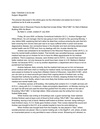
|
2024 aug 20
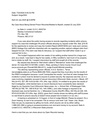
|
More... |
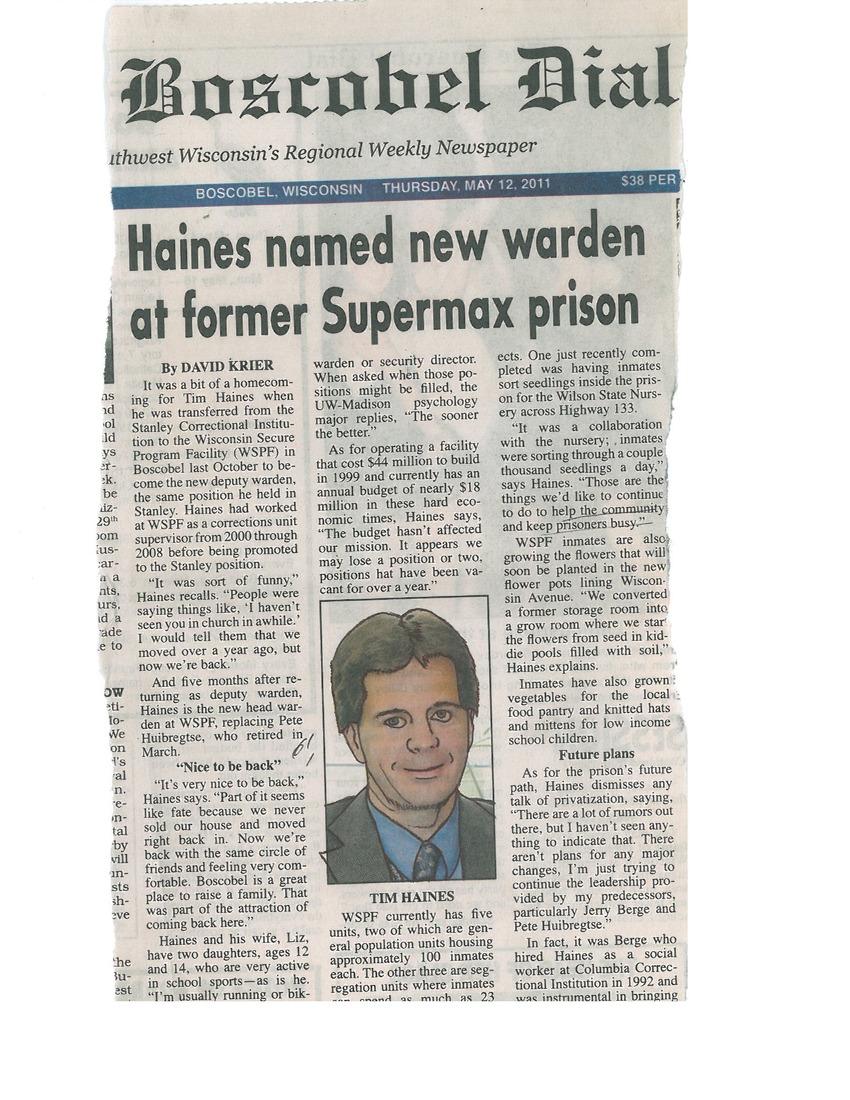
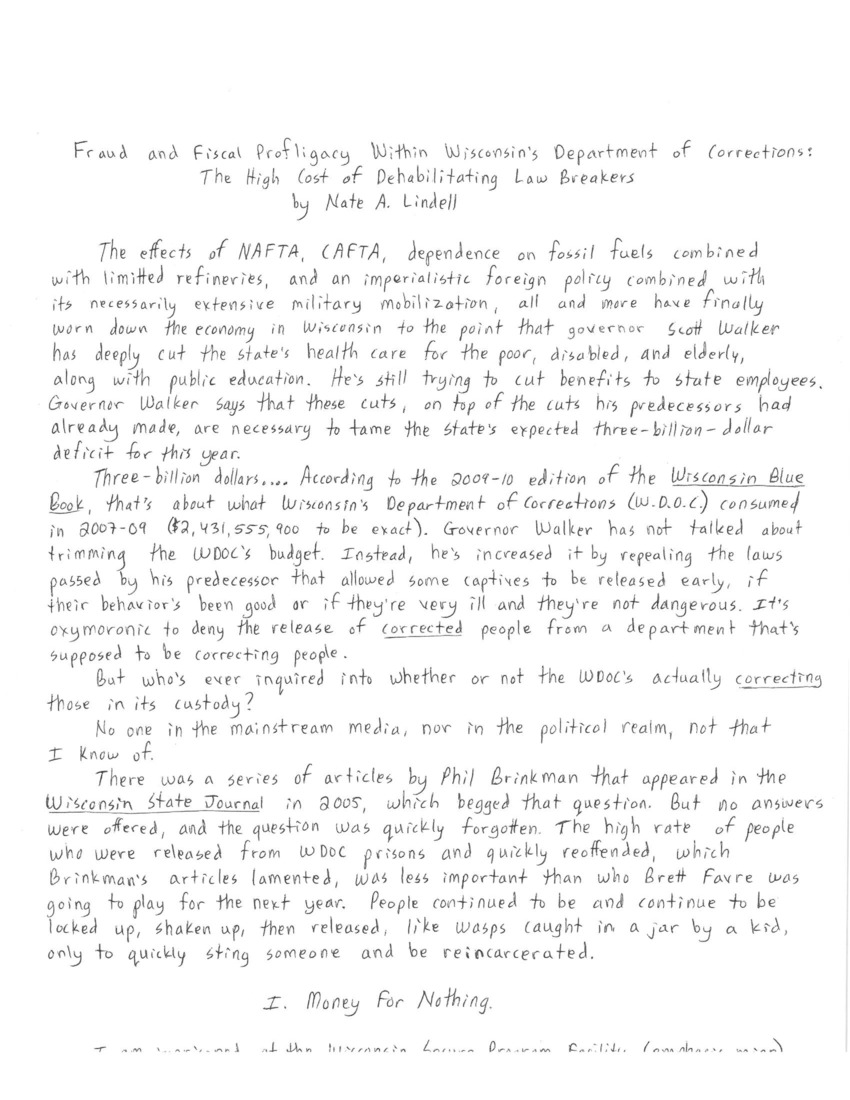
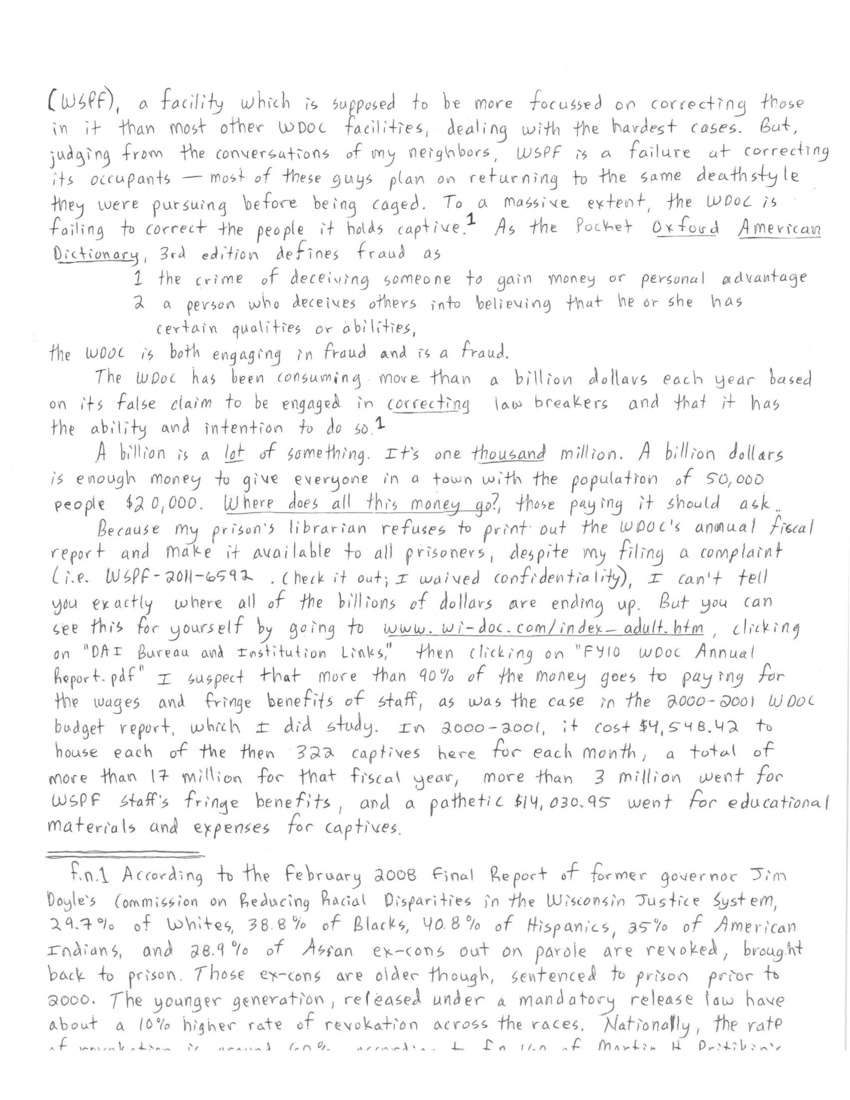
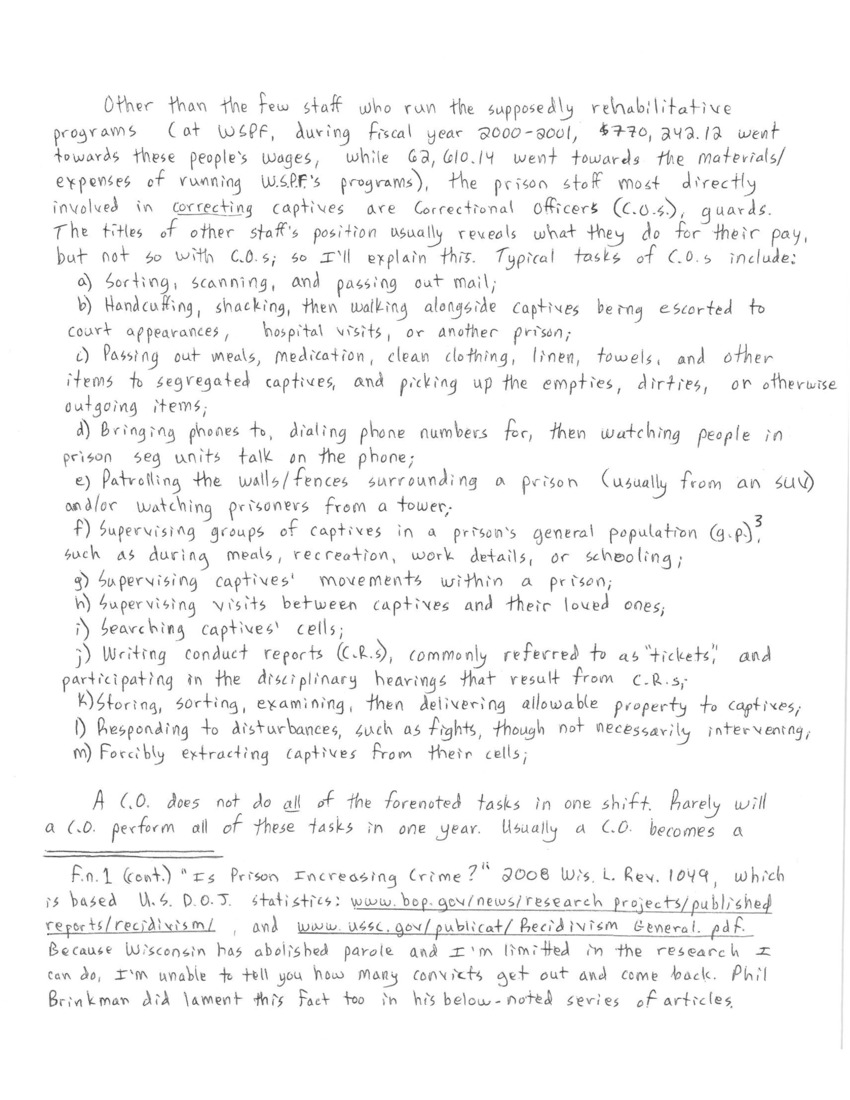
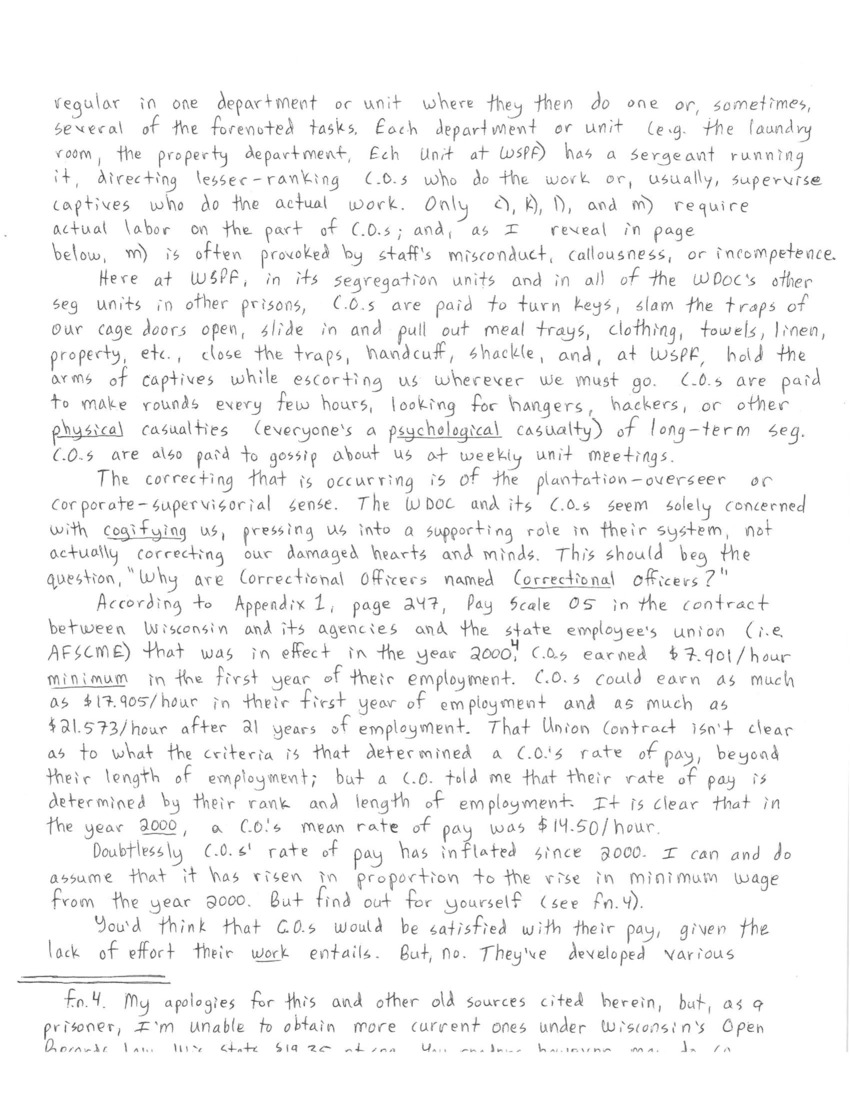
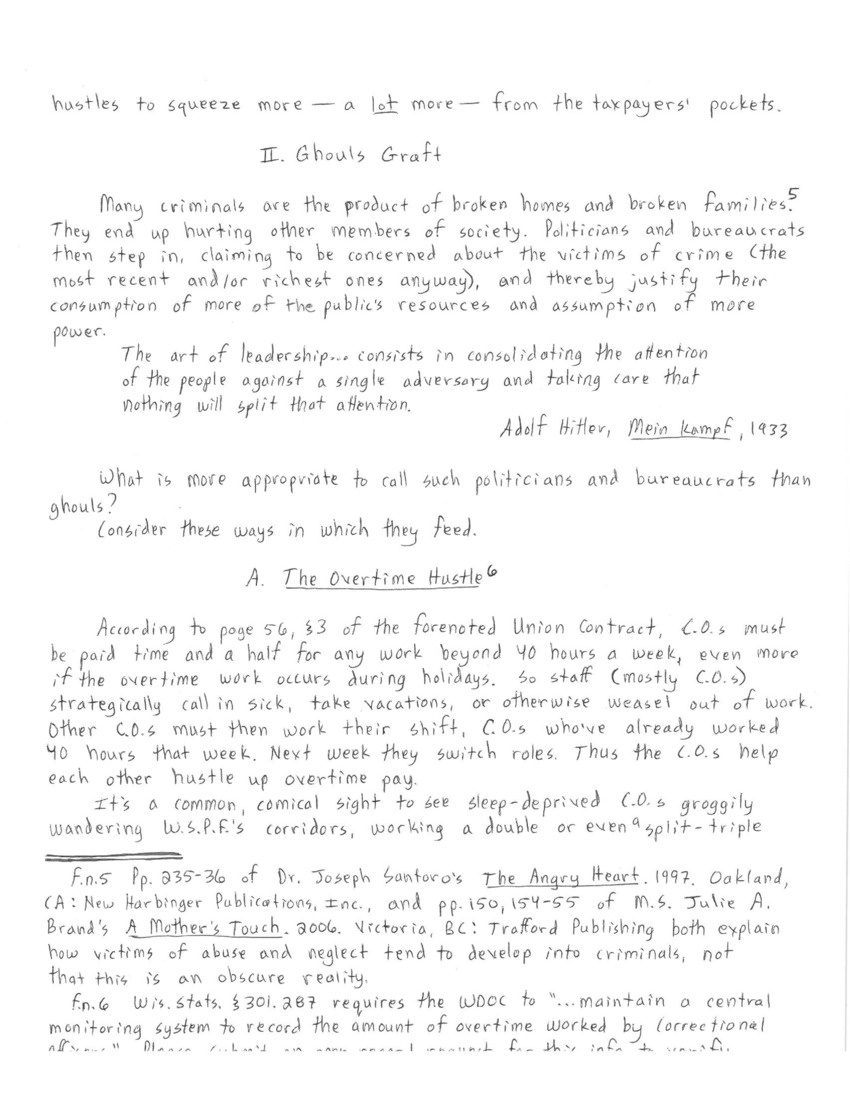
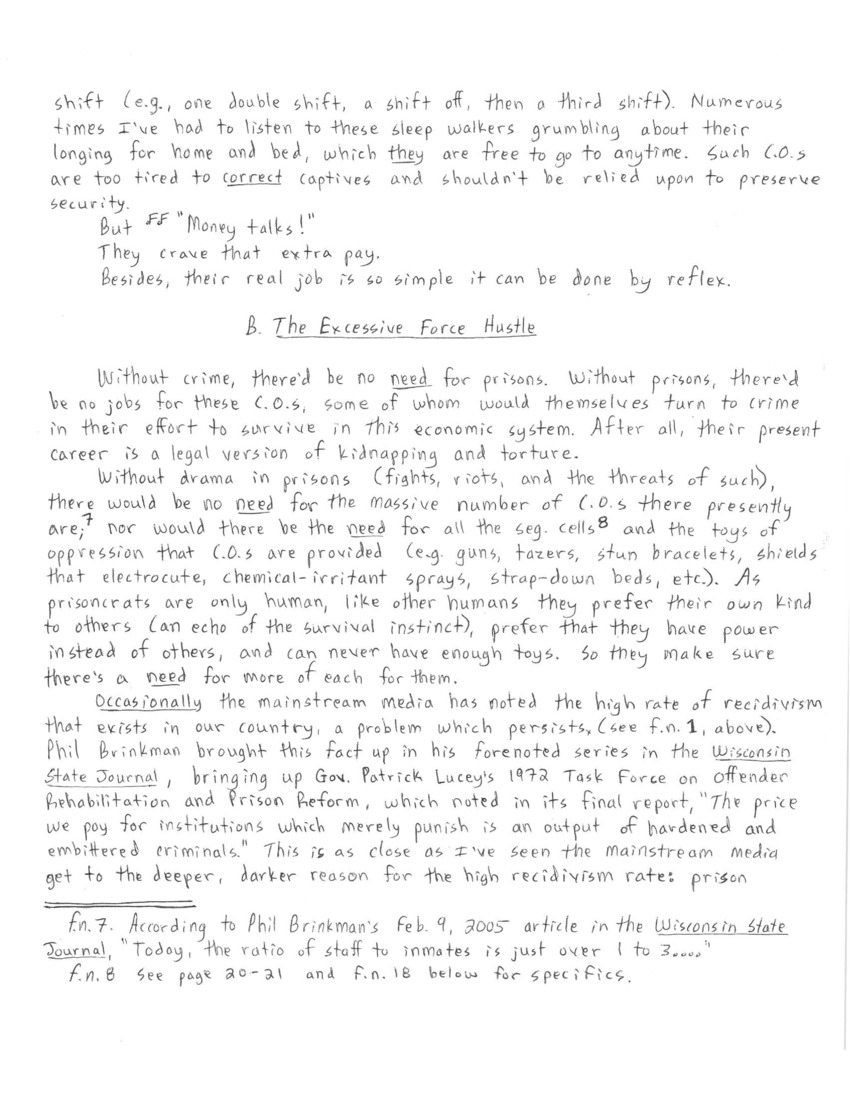
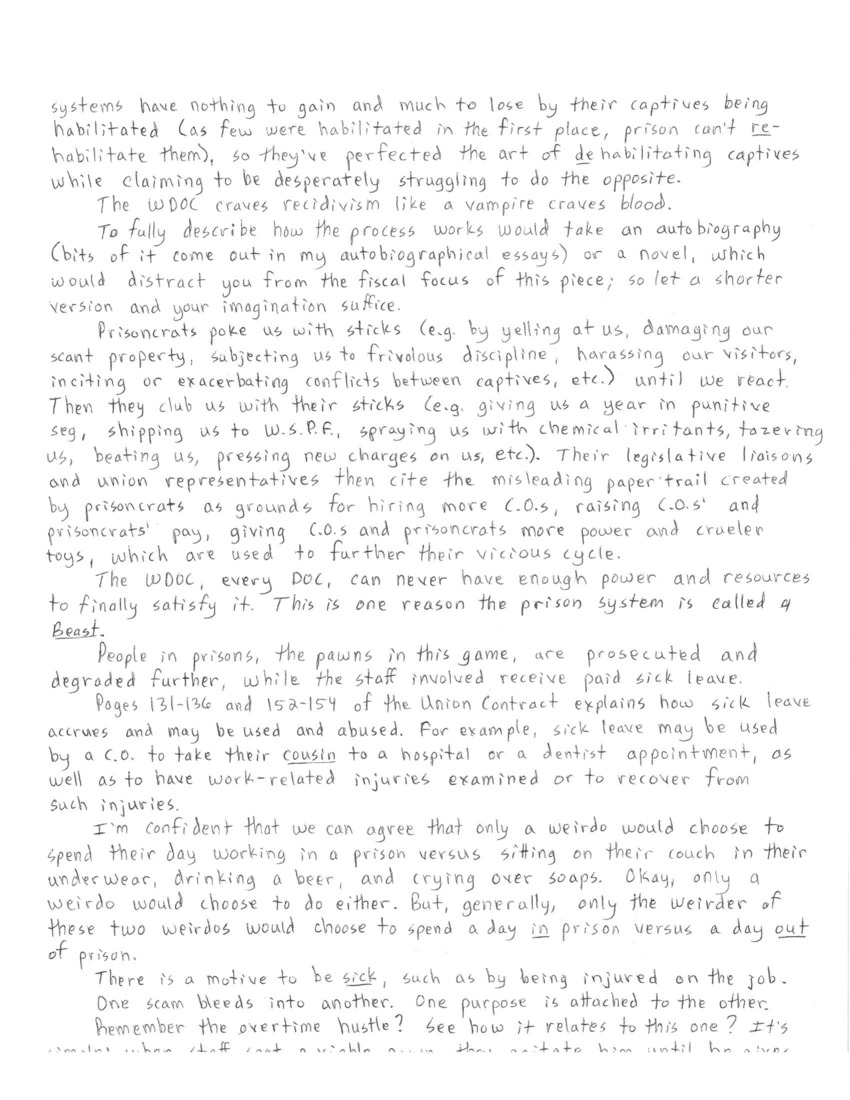
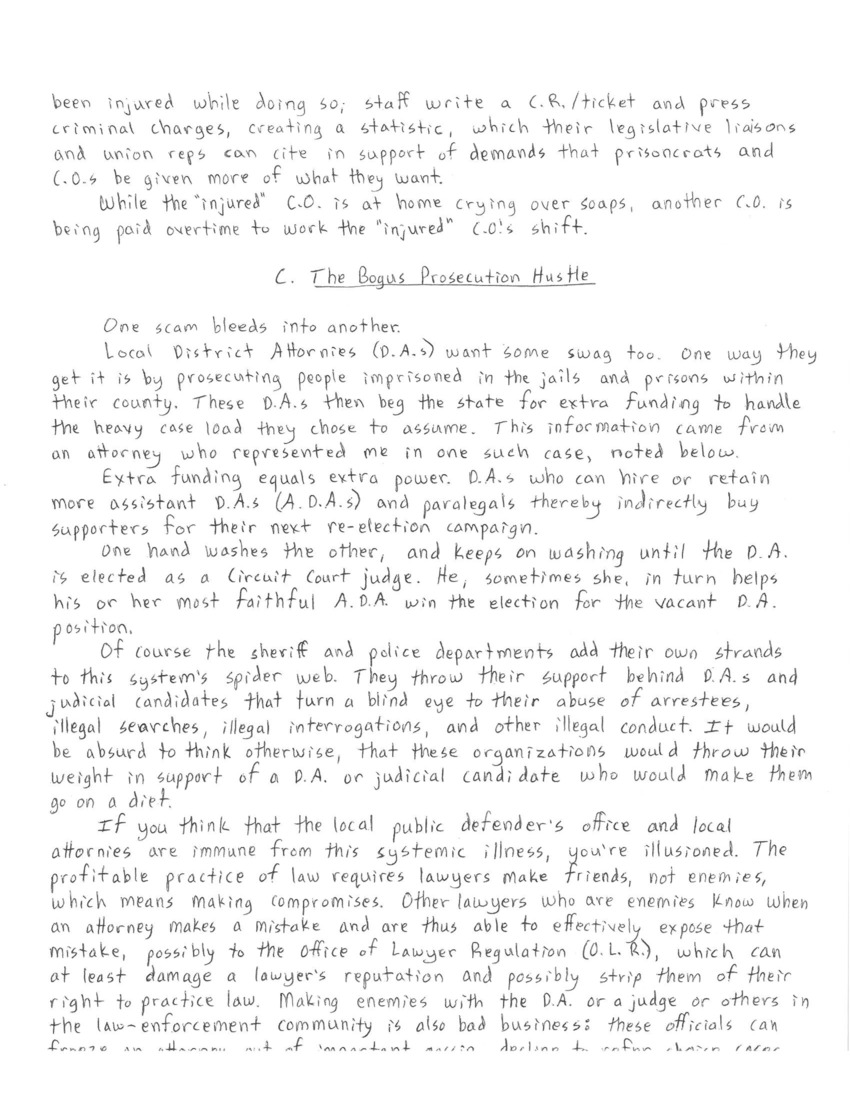
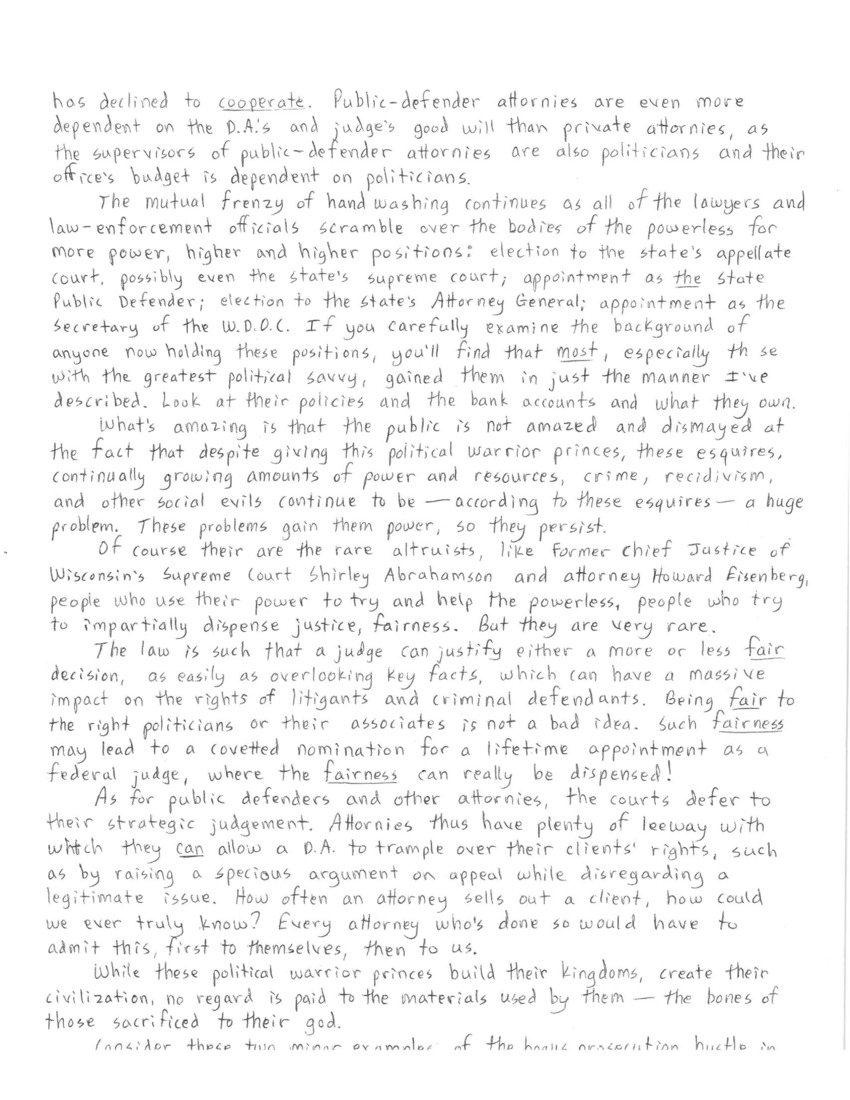
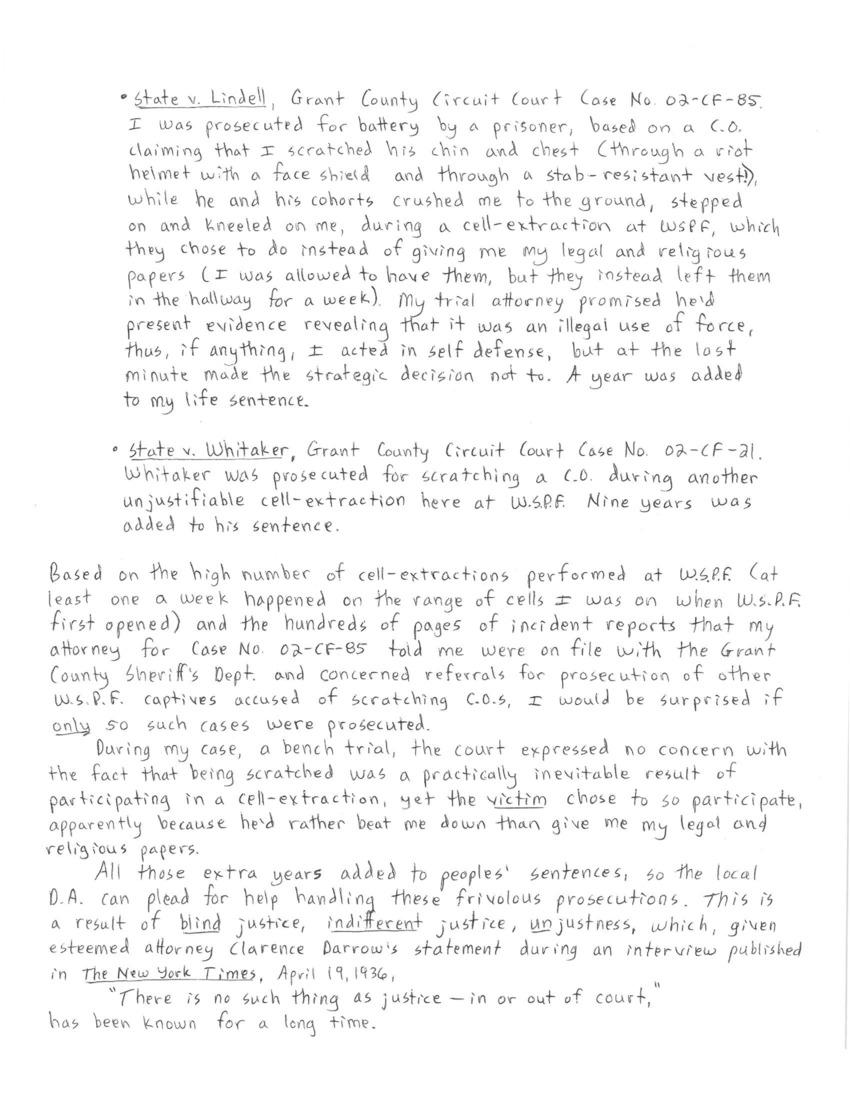
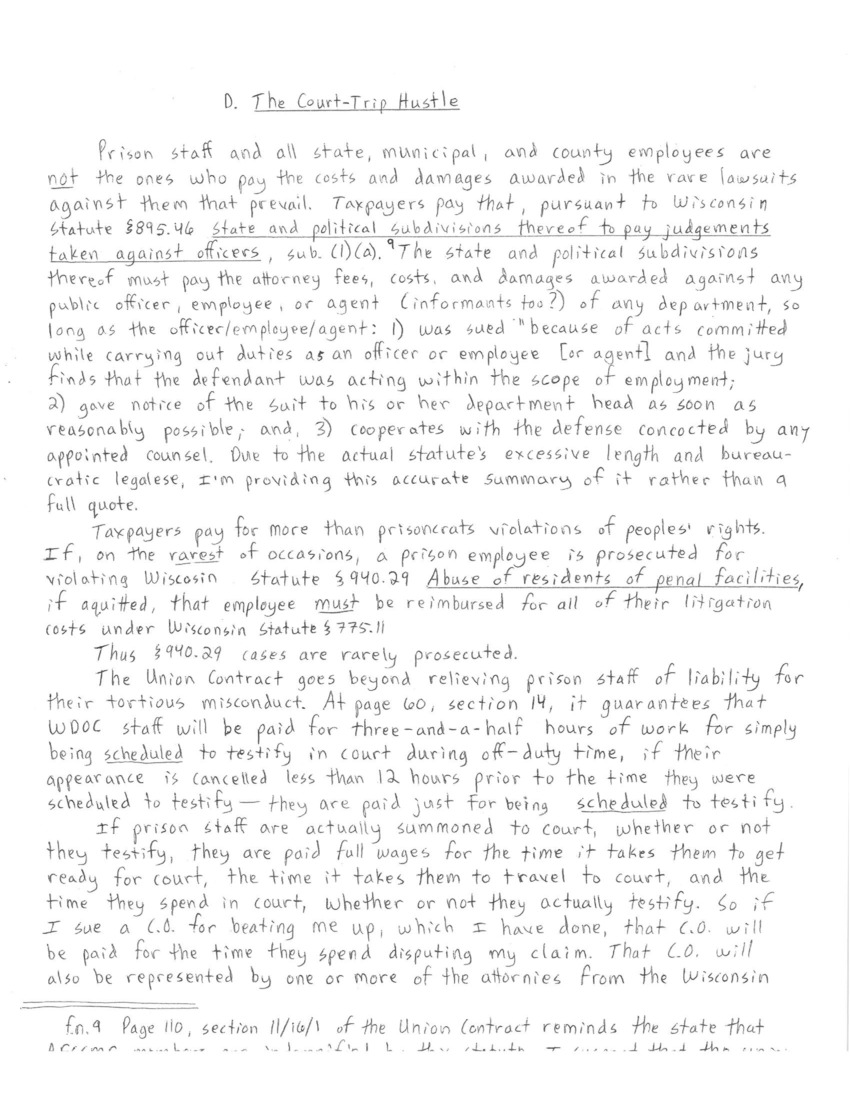
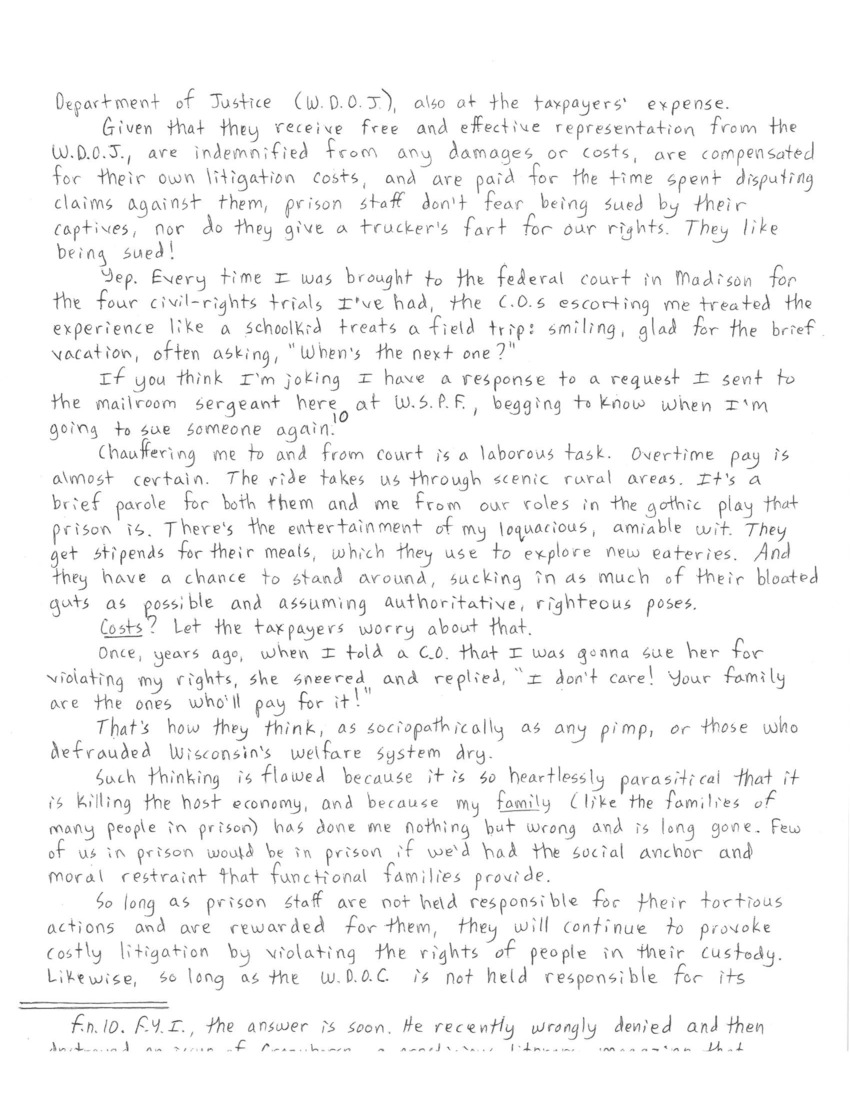
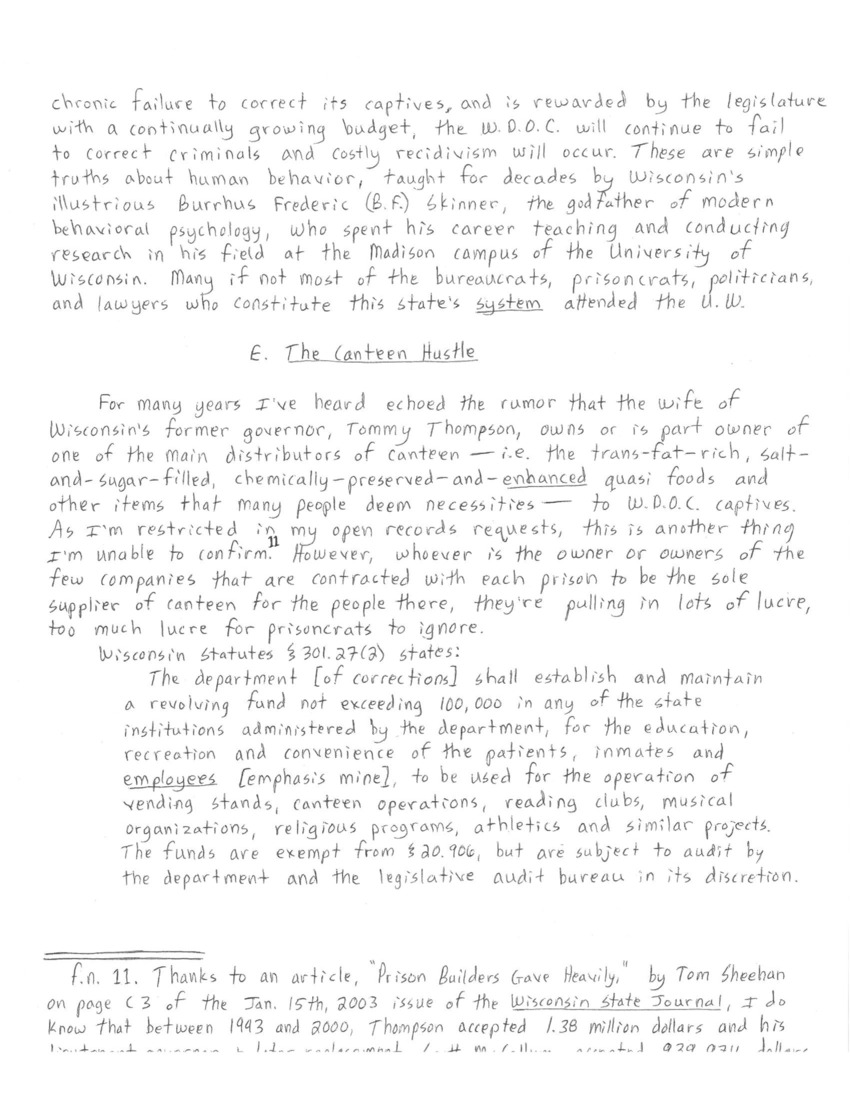
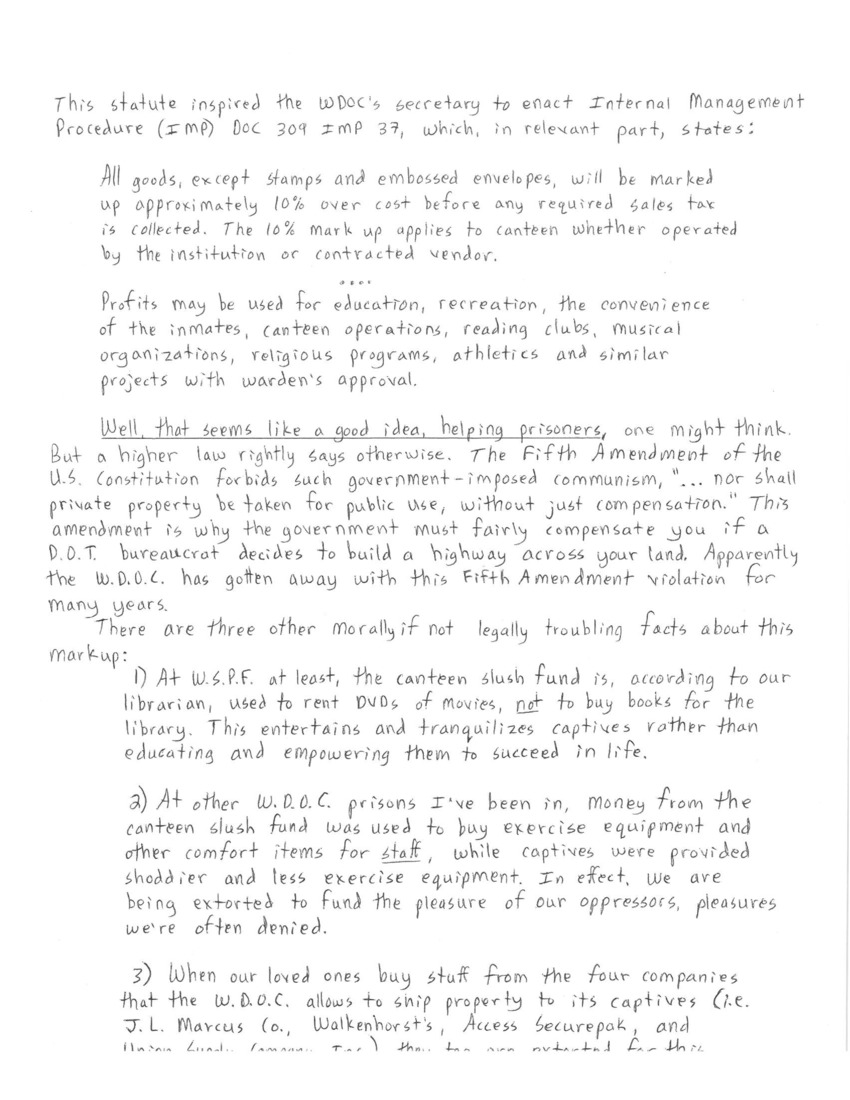
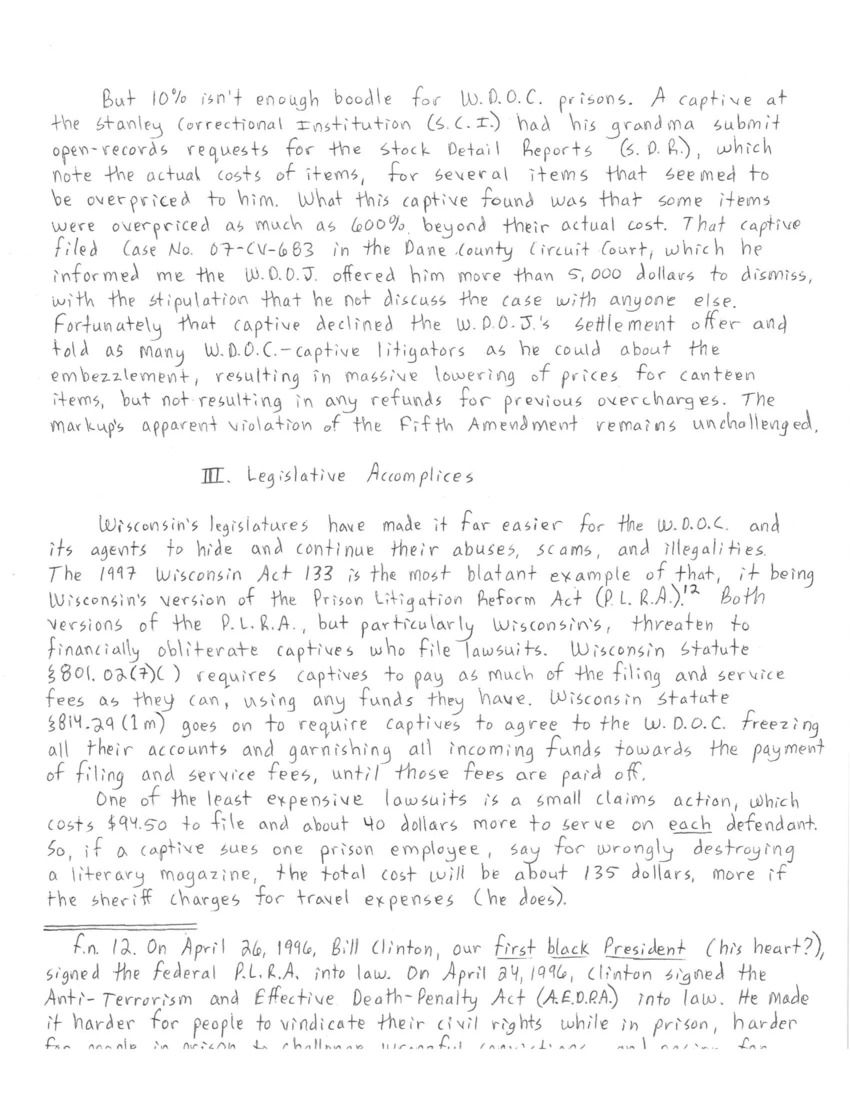
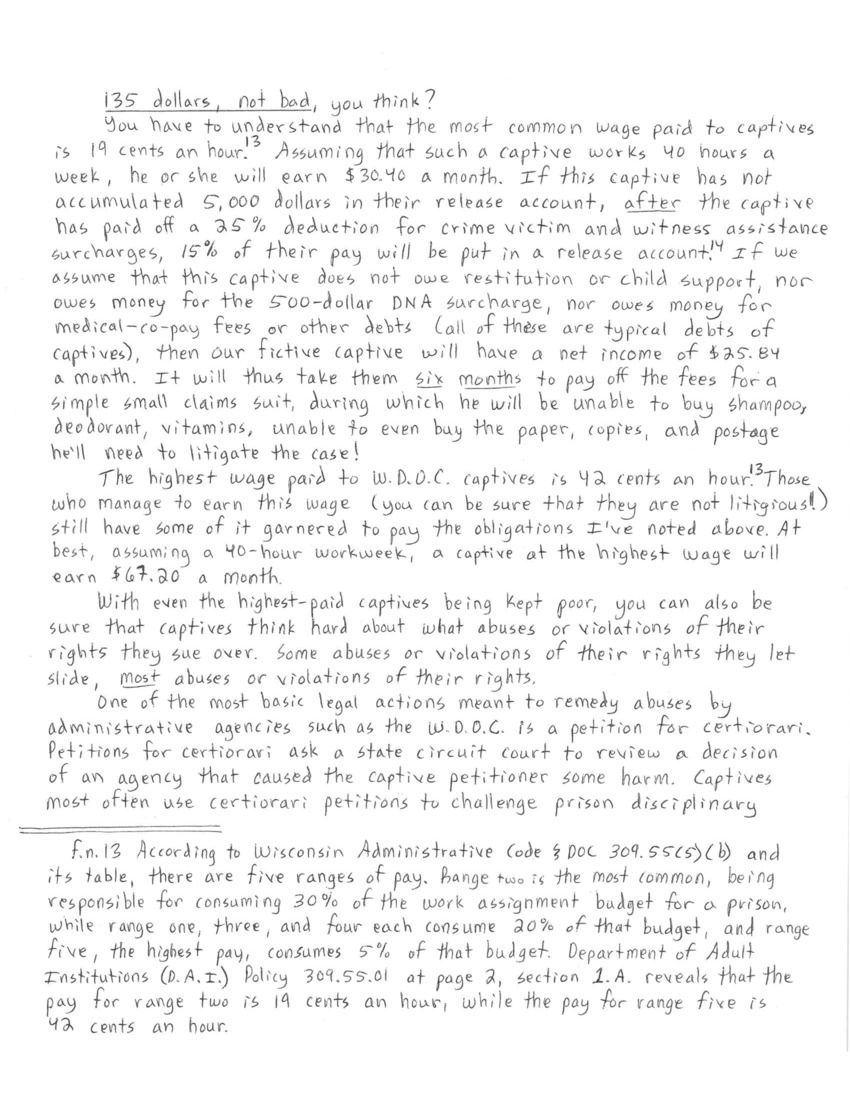
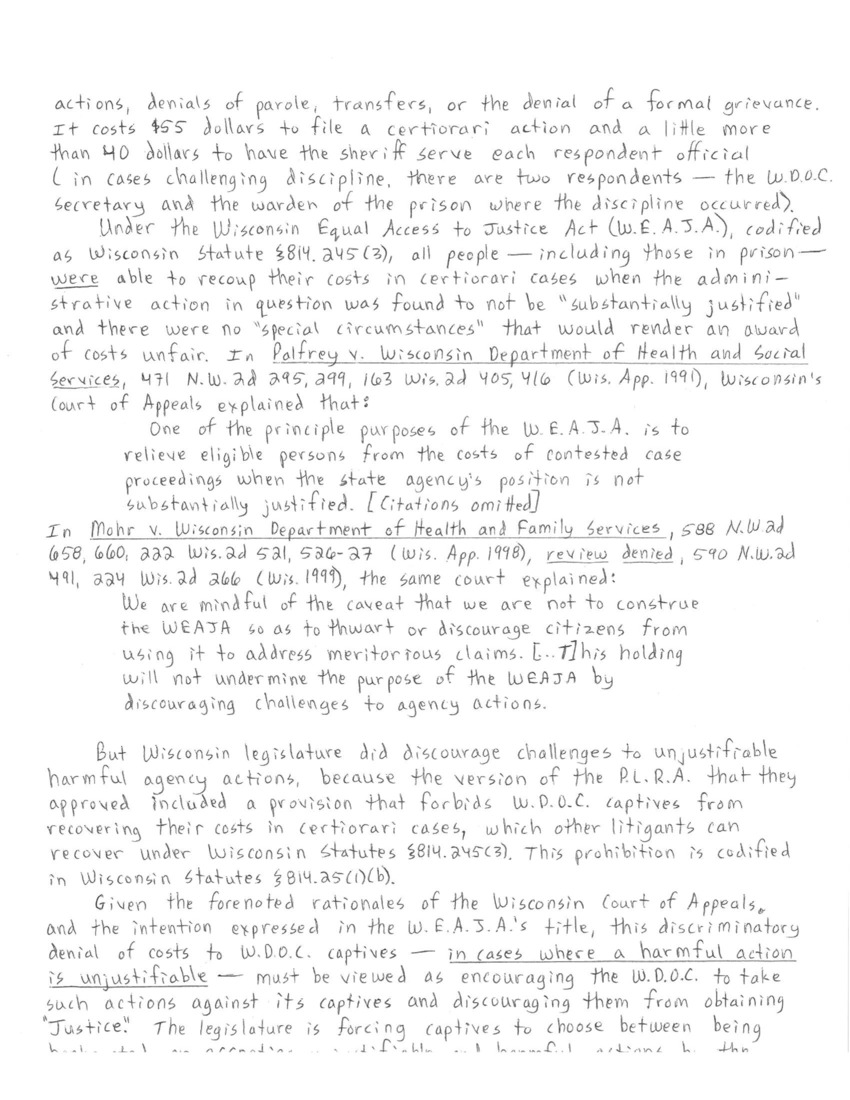
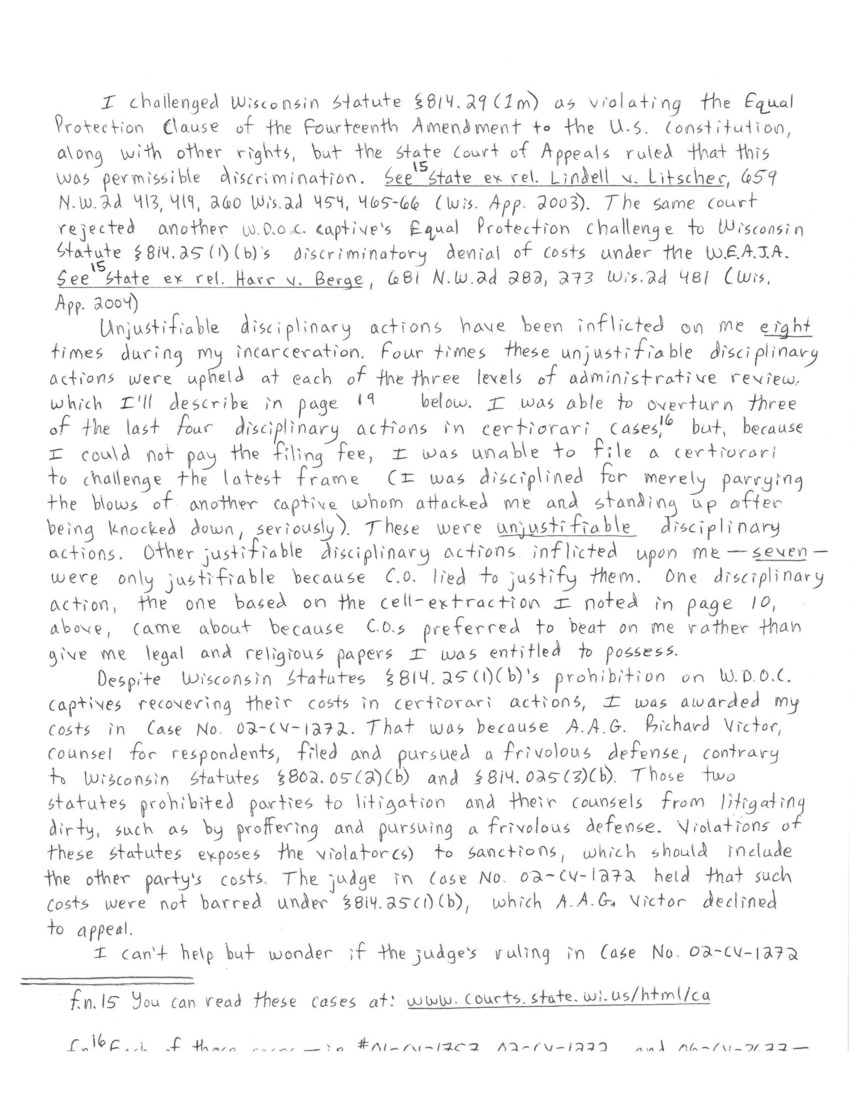
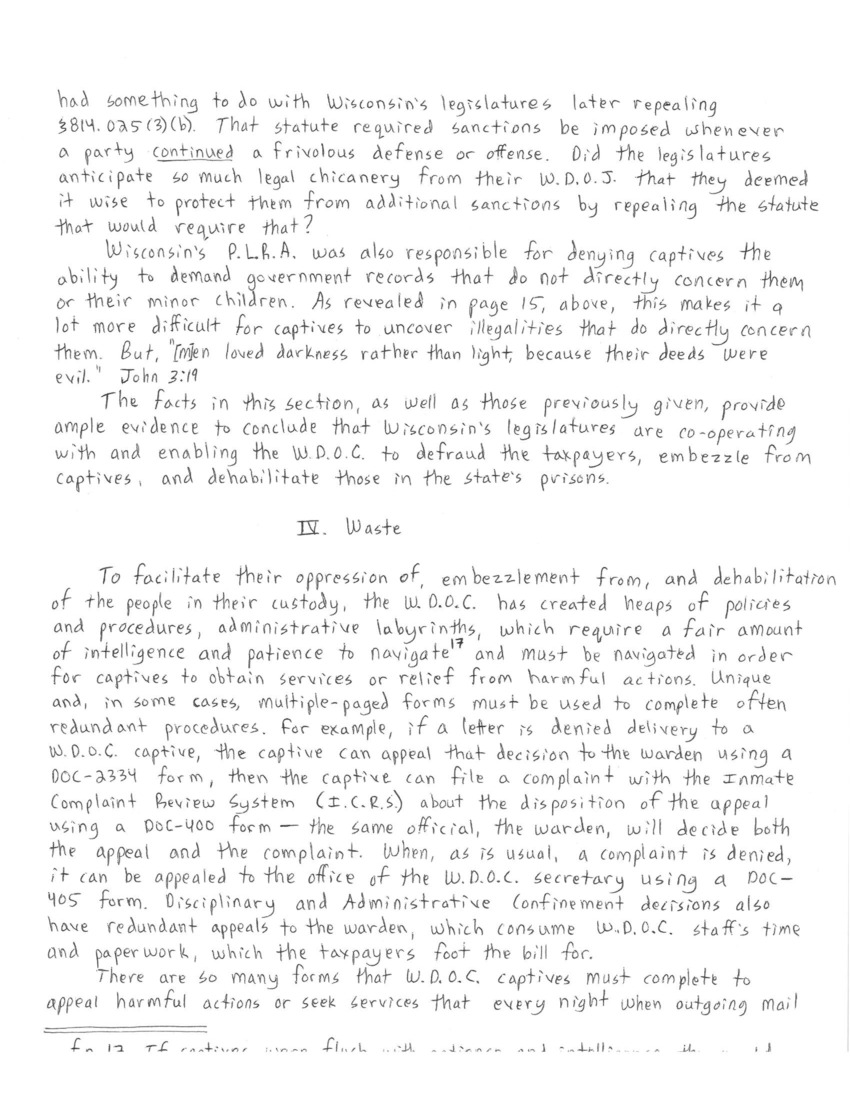
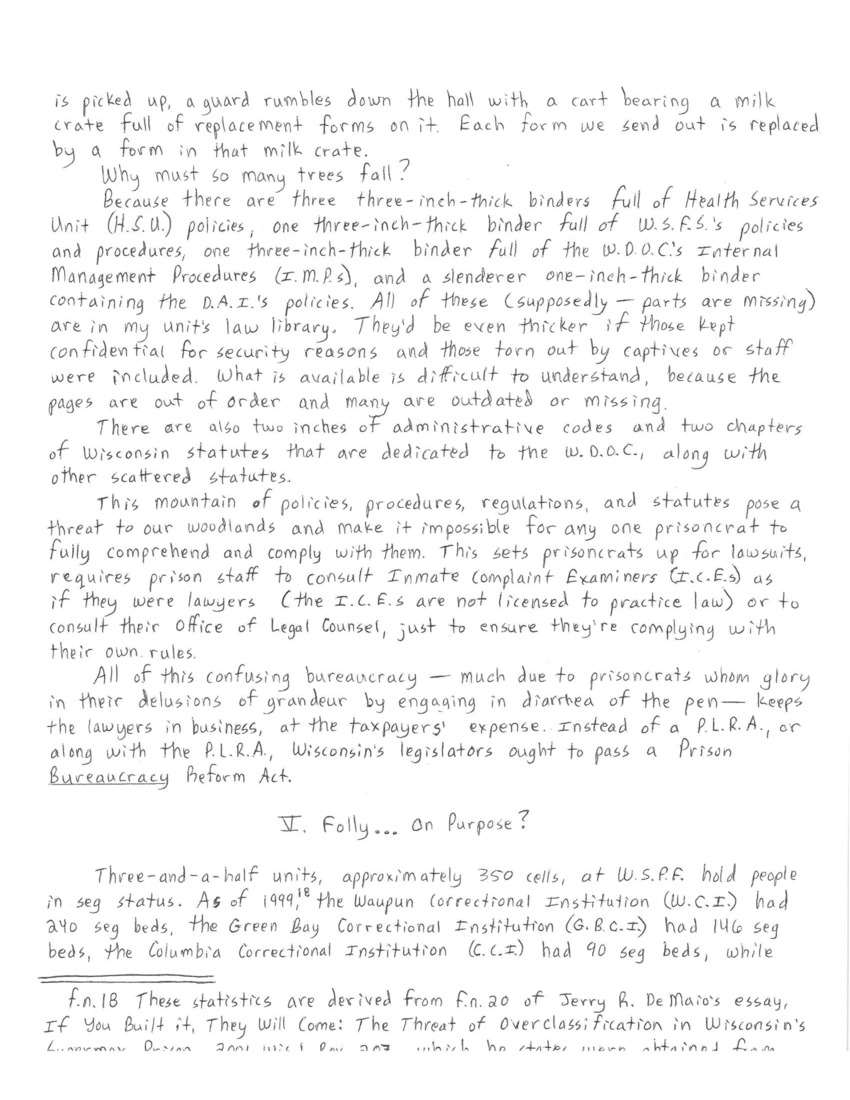
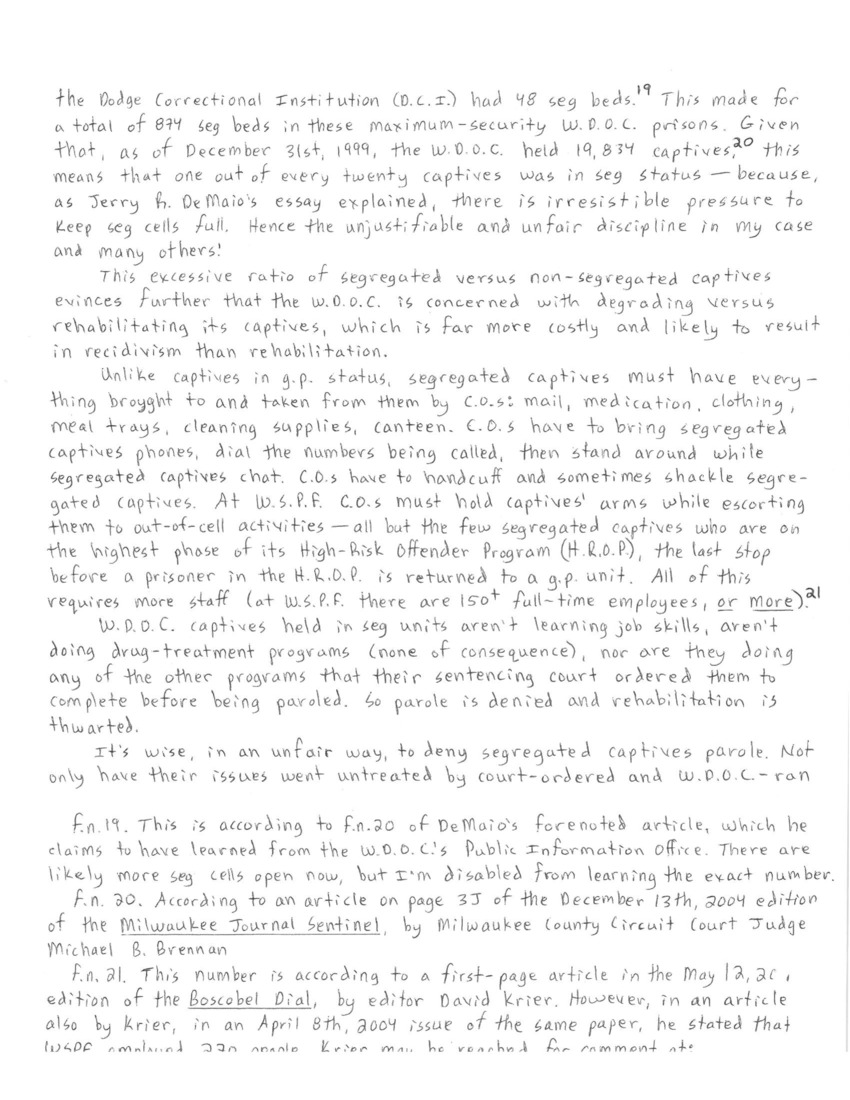
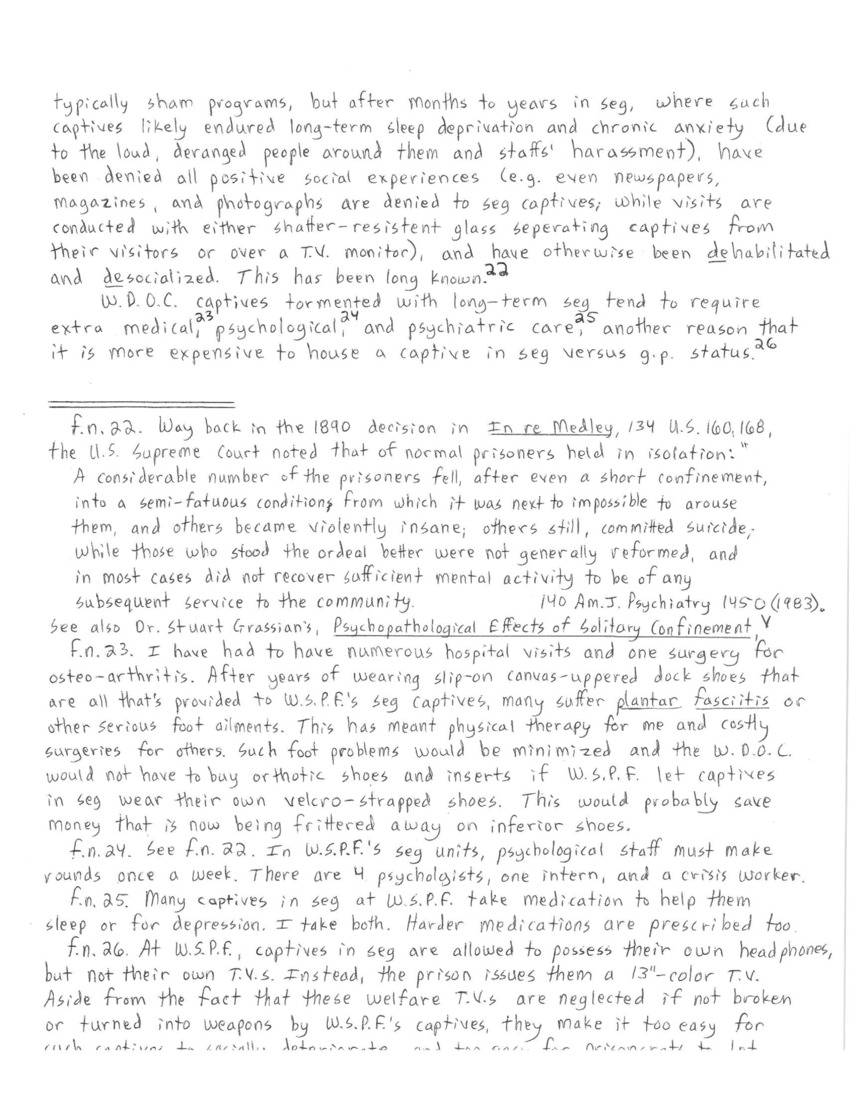
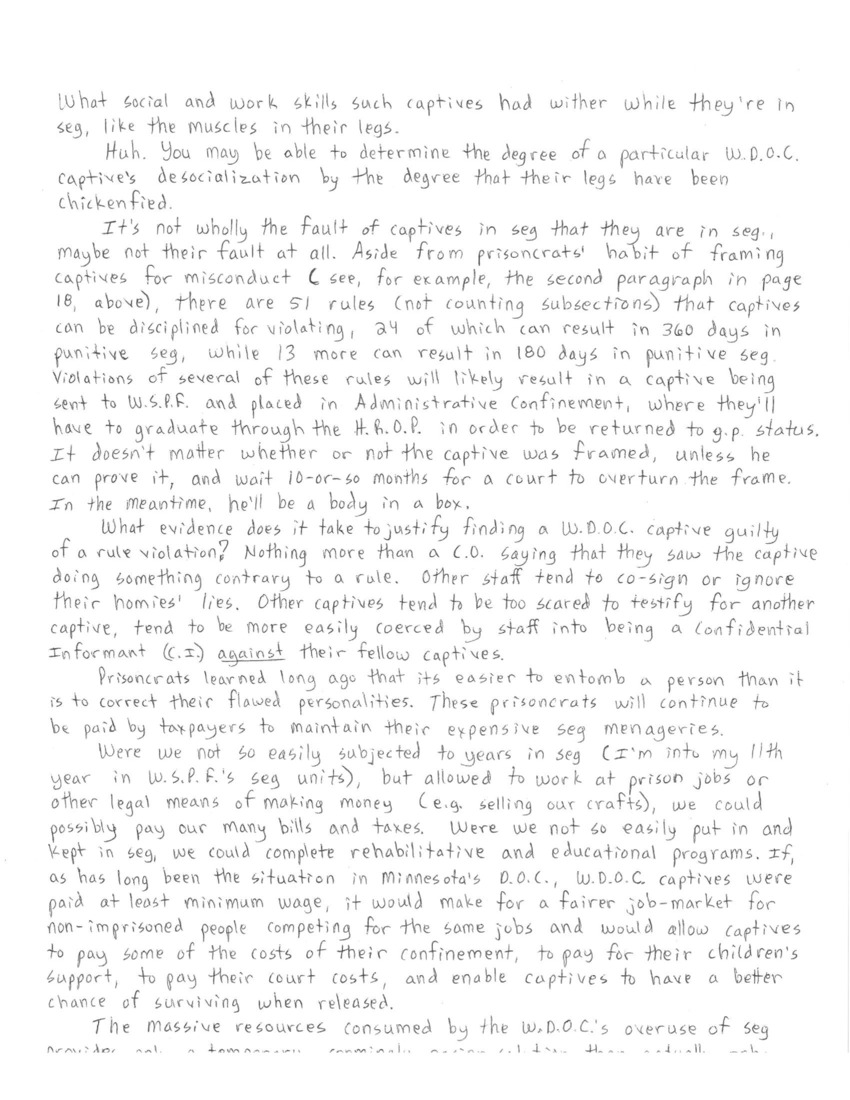
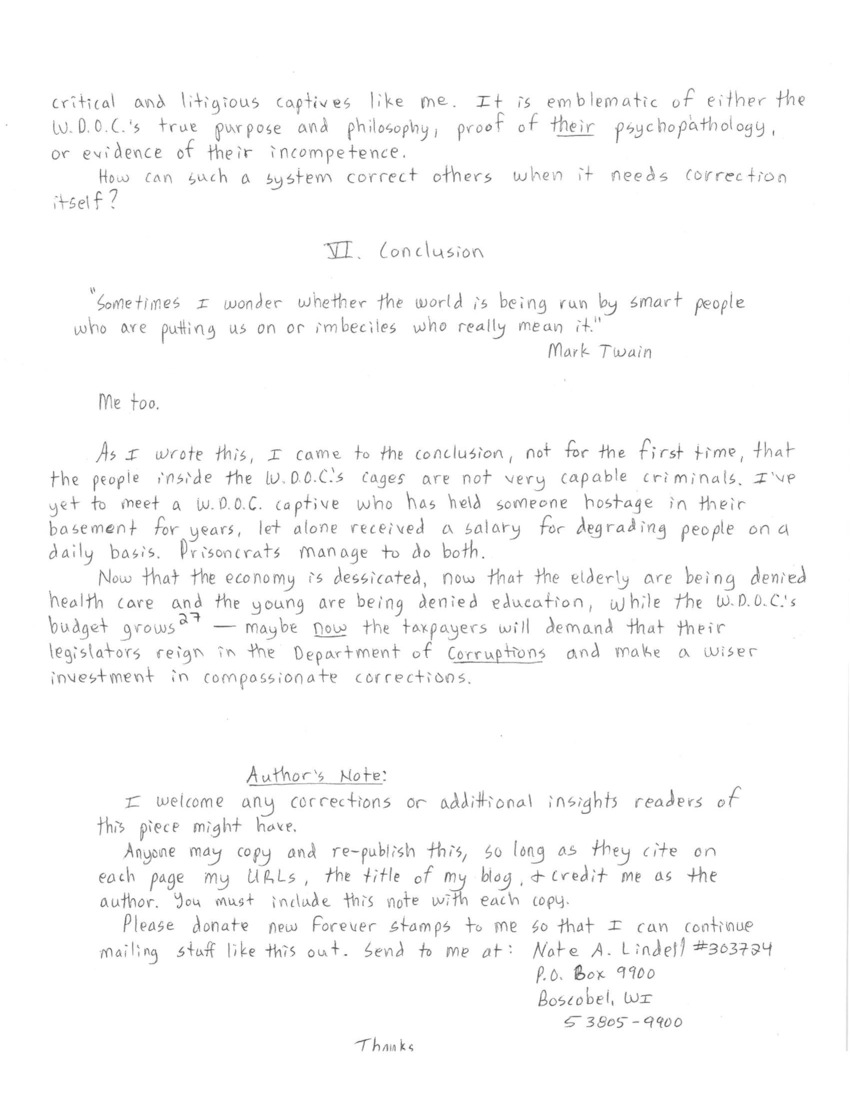

Replies (2)
Haven't finished transcribing. You made this one really hard :-( it's so long, and has so many documents cited on it, numbers and all. You don't need all that, you're not in court, your readers are not looking for proof of what you say. We know the justice system sells prisons as places meant for correction, but deep inside everyone's head, it's a revenge thing. You messed up with us, so nowyou'll be deprived of your freedom.
Don't feel too bad though, you get some art supplies, three meals a day and a place to live, I know people who can't afford half those things. I have a hard time affording them, I work every day for far too many hours and sometimes I can't buy enough food fro three meals a day, my molar broke and I can't afford a dentist, so there's daily pain one has to get used to, and I have never even copied in a school test. I know it's not the same thing, my point is freedom, in or out, is rarely ever about what you're able to do, what you have or what you lack, it's merely a mental states. :)
Have a nice day!